#over your own actions and participation in perpetuating harm
Text
iiii dont think im gonna post much amagaday about this arc, because i don't enjoy the interpretation that jon was completely innocent in taking live statements, nor do i think basira or especially melanie were irrationally upset at him, and i know a significant amount of posts at least read as if people vehemently disagree
#look it wasn't completely his fault either but i think tma is fundamentally ABOUT this question of control#over your own actions and participation in perpetuating harm#but it's so juicy that Jon didn't tell anyone. that's a choice he made. was it a fair one? maybe if he'd told them immediately after#the first or even second they wouldn't have reacted as poorly or could've prevented 3 4 and 5#but its also fair that he was scared to tell them. with how vehemently Basira was fighting monsters. dealing in intel. not people#but he did do it.#he didnt say 'help Basira hold me back! I'm being taken over by the Eye to take Floyd's here statement!'#also i cannot believe it took me seeing that fanart i reblogged to consciously consider the lens of#3 women confronting their friend/coworker/fellow hostage about a complaint from a woman that he harassed her#not that thats the only lens it can or even should be viewed through but#just felt like. oh. duh#also why I've been kinda dreading s5. since thats the one i was actively in the fandom i also actively remember#The Discourse#[dun dun duuun]#funniest post was the one that called tma fake queer representation a full 10 episodes after jon had said 'i love you' to martin#joos yaps#(and also finally... hot jon rights)#(i have a lot of thoughts but i dont want to get too worked up and portray things unfairly so this is all yallre getting today)
42 notes
·
View notes
Note
Part two…
I think I may have perceived the Neil druckmann situation to be a little different than you did. Neil druckmann is from Israel and witnessed this brutality and genocide first hand, since Palestine and Israel have been fighting for many years! He said witnessing this caused a deep anger in him that he harnessed when writing tlou2…
I thought he was using art to make a comment on the situation. Like, he wanted to show that constant fighting over land and religion never leads to anything good. Literally, they showed that the constant fighting between the scars and WLF lead to the demise of both groups. As Shakespeare said, art holds a mirror to reality. Through art, we can make intentional choices that will evoke certain feelings in people. Because of all of the vengeance and violence they participated in, Abby and Ellie both lost everything. Could it be that this theme was missed by you? Art is meant to evoke visceral responses, so it kinda seems like he did his job with that. Also, he supplied financial support to both the Palestine and Israelis, so I’m not entirely sure how it was concluded that he hates Palestine. (I think what is happening oversees is absolutely disgusting, but I don’t see how Naughty Dog is perpetuating the war. Also, you never know what someone has been through or seen, so you really can’t condemn people for compartmentalizing in order to make it through. That is how/why some people are able to temporarily put the bad shit to the back of their mind for a few hours while they click some buttons on a controller.) What is the goal with not buying remastered tlou2? I want to help, but I don’t see how not purchasing a video game will make anything better. I want to understand. Remastered was auto-downloaded to my ps5, since I had it in my wishlist for a while. They already have my money for it, so might as well play it? They can’t benefit anymore from me playing it I don’t think…
while I can agree in the game you see how both side's actions are harmful to one another this isn't the case in real life. In Tlou its clear cut that no side is truly "evil" just the product of violence that isn't their own until they take on the violence but that's not the case in real life with Palestine and Isreal which is where I believe you are misconstruing what I'm trying to say. Palestine didn't do anything to Israel at least not in the same capacity as what Israel has done to them.
Tlou and Palestine/Israeli conflict are different in the sense that there is clear right and wrong, now am I going to sit here and say Palestine is completely 100% innocent no. But in this conflict yes. The people of Palestine shouldn't have to suffer because another nation wants to selfishly take what not there's and kill them to get it.
I am not claiming he hates Palestine but I don't think its fair for him to act like its some their both bad and good on both sides Israelis can walk free in their streets while Palestinians wonder if they will be shot down in there own to "be made an example of". it's not a fair nor accurate representation of the truth.
Not purchasing Tlou 2 shows that using real-world suffering for your profit and gain and not even doing them justice and being fair isn't right nor will be tolerated.
If you truly "want to help" and understand don't argue with me in my asks listing to the dozens of real Palestinians begging you to do what you can and if that means not buying a game then so be it. don't you think they want to be able to sit back and a play game.
I hope this cleared up for you and others why people like me are putting the pressure to not buy and boycott the game.
#ellie williams#ellie x fem reader#ellie williams x reader#abby anderson#abby anderson x reader#free gaza#palestine#the last of us#free palestine#gaza genocide
34 notes
·
View notes
Text
༊*·˚ The Toxic Spiral.


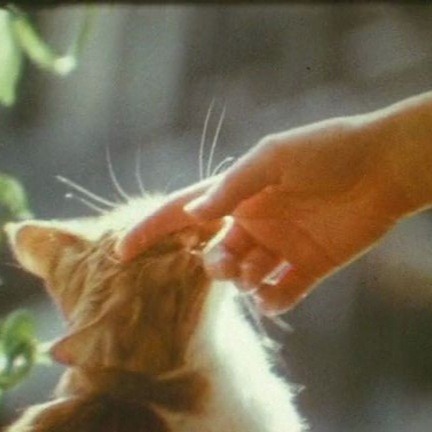
⭑・゚゚・*:༅。.。༅:*゚:*:✼✿ ✿✼:*゚:༅。.。༅:*・゚゚・
It's crucial to recognize the profound impact of our words on both our minds and spirits. While it may seem tempting to engage in gossip, say mean things, or create offensive nicknames as a form of entertainment or humor, the consequences of such actions can be far-reaching and detrimental.
⭑・゚゚・*:༅。.。༅:*゚:*:✼✿ ✿✼:*゚:༅。.。༅:*・゚゚・
Erosion of Empathy
When we gossip about others or make mean-spirited comments, we often fail to consider the feelings and experiences of the individuals we're discussing. This erosion of empathy can have a dehumanizing effect, making it easier to hurt others without feeling remorse. Over time, this lack of empathy can lead to a diminished sense of compassion and kindness, not only towards others but also towards oneself.
Toxic Relationships
Engaging in gossip and using offensive nicknames can perpetuate a toxic cycle of negativity in your relationships. Trust is eroded, and the emotional bonds that tie people together weaken. What might start as a seemingly harmless comment can snowball into a full-blown conflict, leading to strained friendships and fractured connections.
Negative Self-Image
Creating offensive nicknames or participating in hurtful conversations often reflects a lack of self-awareness and self-respect. When you engage in such behavior, it's challenging to maintain a positive self-image. Negative self-talk can creep in, and you may begin to question your own worth and integrity.
Escalation of Negativity
Gossip and mean-spirited comments tend to escalate negativity. When we say mean things about someone or spread rumors, we are contributing to a culture of negativity. This not only affects our own mental state but also perpetuates a hostile environment in our social circles and communities.
Deterioration of Integrity
Our words are a reflection of our character and integrity. Engaging in hurtful speech or gossip can tarnish your reputation and erode the trust others place in you. This deterioration of integrity can harm your self-esteem and make it difficult to maintain healthy relationships.
Disconnect from Authenticity
Toxic behaviors like gossip and offensive nicknames can disconnect you from your authentic self. When you engage in these behaviors, you are conforming to negative social norms rather than staying true to your values and principles. This disconnection can create inner turmoil and inner conflict.
⭑・゚゚・*:༅。.。༅:*゚:*:✼✿ ✿✼:*゚:༅。.。༅:*・゚゚・
In a world where kindness and empathy are needed more than ever, it's crucial to recognize the harm that saying mean things, gossiping about others, and creating offensive nicknames can inflict upon our minds and spirits.
3 notes
·
View notes
Text
Habit shift #27 - Learn from other women
- practical actions that can be taken to fight internalized misogyny.
Why: To summarise, men don’t understand, and women who teach need your support. Men do not understand everything as well as they would like you to think. They do understand the male perspective — which is arguably the standard perspective — but they don’t have room for anything else. They don’t want to make room for anything else. Men will teach you to perpetuate sexism; men will often teach you to hate yourself and discount your own capacities. They are fine with their unchallenged status quo, with the way men have always done things. You too can — if you’re lucky — do the things men do, but only if you do it the male way without complain or comment. No man has your best interests at heart. Moreover, men in teaching positions hold power over you (they can choose to keep knowledge from you if you don’t behave) that can very easily be mishandled. This leaves you vulnerable, especially given that learning requires you to be open and to make yours concepts and ideas which were foreign to you. Learning from men always means being on the lookout for the misogyny they entwine in everything; always having to take measures not to fall prey to wrapped perspectives; or even to physical harm if you encounter one of the most sinister specimens. And this being said, women teachers need your support. Misogyny often means that they are discounted by both male and female students as incompetent or whatever negative stereotypes are associated with women who know too much. Women teachers share perspectives, life experiences and body types with you and so are better suited to understanding what might be an obstacle to your learning.
How: Be an active participant in your own learning. When you can, ask your questions and ask for help from female teachers. If you’re pursuing new knowledge on your own, make the effort to look for and find women to teach you the skills you are trying to gain. Get your friends to join with you and encourage your female acquaintances to seek out female teachers. And don’t discount the experience and the skills of the women around you. Learn cooking and baking from your mother, from her mother, from your aunts or the old woman living down the street. Learn mending from that friend of yours who makes her own clothes. Learn how to change tires and take care of your car from a woman on the internet. Learn a new language from a woman across the globe who wants to learn yours. Ask another woman to mentor you in the class you struggle with at university. When women around you decide to carry out projects, offer your help so that you can gather experience from them. Ask them point blank if they’d be open to sharing what they know; don’t be offended if they ask for some form of compensation. Teaching is a huge endeavour and a time-consuming one, and no woman owes it to you. But if you do show respect and dedication, you might learn more than you expect.
99 notes
·
View notes
Text
Shigaraki’s Plus Ultra

Chapter 281. The chapter is called “Plus Ultra” because Shigaraki is showing the same Plus Ultra determination the heroes always show. It’s the same scene. Deku screaming after the Muscle fight is a direct parallel to the way Shigaraki screams here the pose is exactly the same. It’s y’know, a parallel? Them boys are the same. Horikoshi loves setting up parallels. Now the villain of the story is parallelling the hero of the story, continuing to fight against an impossibly strong enemy even while his body is breaking down and everybody else is begging him to just give up already. Shigaraki is just another hero of the story, he has an origin that motivates him (like Bakugo, Shoto, Deku) he has a group of friends that he fights for, and now he’s going way beyond plus ultra to defeat the bad guy in front of him.
1. Muscle Fight
There are several parallels to the muscle fight within this scene which was Deku’s first big solo moment as a hero in the manga.
The first is that we’re getting a repetition of the idea that heroes hurt their own families to save total strangers. Deku is told directly that Kouta’s parents chose to die as heroes to save a random civilian rather than come home alive for the child who should have been their first priority.
Yes, it’s not like it would have been right to let a random person die but still. The two parents knew being heroes was a high-risk occupation. They chose to have a child, then they chose to take that risk and not have the child be their first priority. Kouta’s bitterness is over the fact his parents chose to be heroes rather than be his parents.


Shigaraki’s words and situation mirror Kouta’s, because Shigaraki is the analog of all abused children in the story. Himiko, Dabi, Hawks, Kouta, even Eri they are all meant to foil Shigaraki. Shigaraki is a victim of the current hero society, and he’s also a metaphor for all the other victims. He and Kouta says these things because they’ve both been through it. Kouta’s parents hurt him by not making him their top priority. Nana Shimura chose to be a hero, instead of retiring as a hero and being a mother to her son and going into hiding with him and that’s something Kotaro and then Shigaraki faced the consequences of.

Shigaraki knows that hero’s don’t save people, and instead focus on punishing problem elements to maintain a status quo in society because he’s lived it. Kouta doesn’t see why his parents were out being heroes in the first place when they could have been at home raising him. Shigaraki lived in a busy town filled with heroes, and yet with a surplus of heroes running around on the street no hero even tried to save him.


It’s not because Shigaraki did anything wrong, he was a five-year-old kid. It’s because saving him would have been difficult, he was ugly, he was dirty. Shigaraki is saying that collectively hero society works by ignoring what the real problems are, and instead, everybody focuses on the glamour of heroes and pretends everything is okay. When heroes don’t even need to exist in the first place. That��s what Kouta says as well. His parents didn’t need to be heroes. If you choose to bring a child into the world, your first priority should be that child because they are completely dependent on you. The child doesn’t have a choice, the parents do.

“Heroes hurt their families to help complete strangers” is also a rallying call to show that heroes aren’t protecting the people most in need of protecting, people like Shigaraki, Dabi, Kouta, who are all the biggest victims were also people who were literally related to heroes but didn’t get saved. Heroes don’t save the people they are obligated to save. We see this repeated time and time again. Endeavor cared more about being a hero than his own family, to the point where he neglected two children, let Touya die, and then beat up his own son in “training” for most of his life. Shimura Nana abandoned her child and left him with lifelong scars.
It’s not just that the heroes are flawed though, or that they fail sometimes. If it was just that, then Shigaraki’s response wouldn’t be merited.
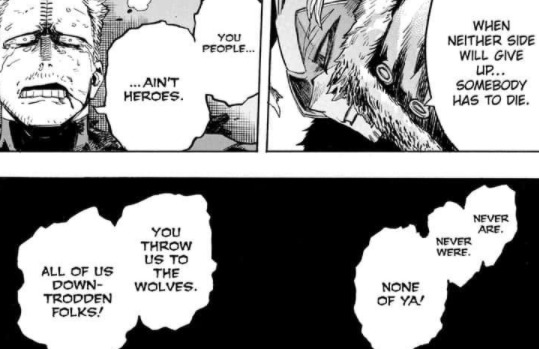
Shigaraki, Twice, Dabi, and Himiko the people who have suffered under the system the most have been repeating the same criticisms again and again. One, the system still allows abuses to happen (Heroes hurt their own families) and two Heroes don’t actually fight to protect victims they fight to protect the system itself (Heroes don’t save people).
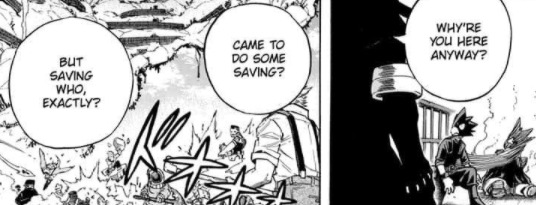
If heroes don’t save their own families and the people closest to them, and they don’t save the people who are the biggest victims of the system then who are the pro heroes saving?
Heroes are not defending people, but rather the hero system itself. The hero system convinces people that it needs to exist when it doesn’t keep general peace, and rather than actually trying to improve the society they instead keep the conflict between heroes and villains going because that conflict convinces the masses that the hero system is needed. It’s as Kouta says, people are going to keep calling themselves heroes and villains and fighting each other forever and it’s stupid.

This system feeds into itself. Shigaraki is literally telling us what happens. People like Twice, Himiko, Dabi, Spinner all get cast out for not meeting society’s standards. They eventually get radicalized and fight back and retaliate against a system that has been violent to them. Then the heroes put them down. Then, more people get cast out. As Shigaraki says, this system is just going to keep perpetuating itself forever. Heroes don’t protect people, they protect the system that is in place first and foremost.
Anyway, back to the Deku and Kouta scene. A hero tries to kill a child.

Deku, even though he’s fighting all alone with no back up at all against an enemy FAR MORE POWERFUL than him, just WON’T STOP FIGHTING.
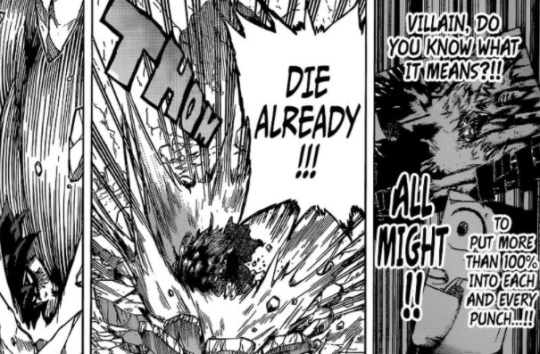

Shigaraki faces enemies who are trying to kill him. However, just like that Deku, he WON’T GIVE UP, even when his body is far past the point of breaking. Shigaraki is told to die, just give up and die, over and over again by everyone around him but he keeps fighting against that.

Deku’s number one priority is that he has to fight back against the villain who killed both of Kouta’s parents in order to save an abused child.

Shigaraki is that abused child, fighting back. Muscle was someone willing to kill a child. Who is Shigaraki fighting against now? Three people who made a choice to harm children.
Gran Torino chose to do nothing when Nana abandoned her child, and then never checked up on that child after she died. He chose to help Nana, rather than helping the child she abandoned.
Endeavor abused Shoto in order to make a hero that can surpass All Might. He chose to be the number one hero, rather than Shoto’s father. He also only chose to have a family to benefit himself and his ambitions in the first place.
Aizawa Shota literally had a friend die on a hero internship and knows the dangers of it, but he chose to let the kids all come along into a warzone and fight against villains who will be trying their best to kill them.
Not only is Shigaraki Kouta, but there’s also a scene where Kouta gets victim-blamed.


The question asked is who is at fault.


We see the same victim-blaming behavior done by the heroes this time. It’s Shigaraki’s fault for being born, being kidnapped by AFO, for manifesting a destructive quirk, it’s what Shigaraki is told over and over again.
And the abusers who Shigaraki is fighting against all have no reaction. Endeavor literally has no self-awareness when he hears Shigaraki say “My father told me heroes hurt their own families in order to save random strangers.” Even though... that’s exactly what Endeavor did.

Gran Torino’s dying flashback shows us just that. He blamed Shigaraki, not because Shigaraki was at fault but because he just couldn’t admit that he was the one who made the wrong choice. Gran Torino is literally partially to blame for what happened to Shigaraki, the same way Kouta is directly confronted by the villain who killed his parents.
Shigaraki is having his plus Ultra moment right now. He’s struggling against an impossible enemy all alone and trying to bear the conflict on his shoulders. He even physically parallels the actions of several heroes. He did the “Plus Ultra” pose with the wrong arm like Endeavor did after defeating the high end. (One step further, he parallels the High-End fight by getting up and continuing to fight even after being horribly scarred by the enemy). He is giving him all fighting against a villain, that villain is just all of hero society.
2. Two Heroes
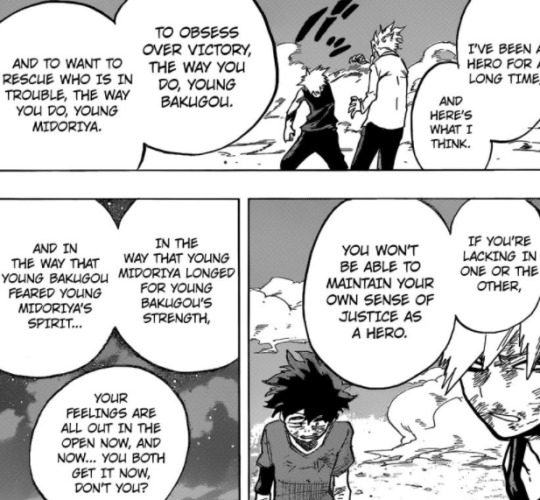
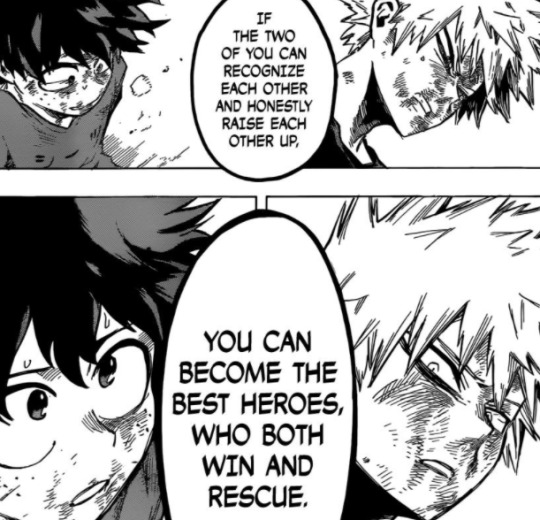
All Might suggested that what Deku is lacking in as a hero, he can find and make up for by recognizing that quality in someone else and working together with them. However, Deku’s problem isn’t really that he’s not obsessing enough over his personal strength. Like, get stronger has basically been Deku’s objective since chapter one.
Bakugo isn’t the deuteragonist of this story, Shigaraki is. Shigaraki is the second hero that Deku needs to recognize. The reason why is simple, Deku has this strong urge to save people, but he doesn’t know what saving people really means. He thinks saving people is swooping in to defeat a bad guy and that’s it.

Deku can’t tell Kouta anything of substance, because he doesn’t understand Kouta’s problems, which is exactly what Shigaraki himself says. The thing is Deku is participating in the victim-blaming here. Deku says that it’s KOUTA’s FAULT because KOUTA IS THE ONE REJECTING OTHERS. However, it’s the other way around. It’s Kouta’s parents who first rejected him. Then it was everybody who praised Kouta’s parents as heroes when they failed their responsibility for their children. They’re incapable of understanding because they haven’t suffered it.
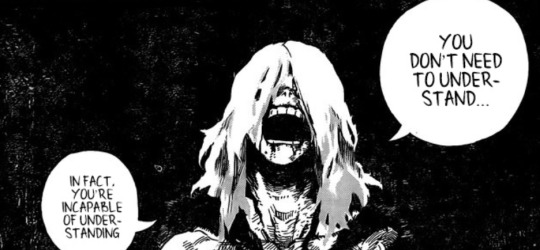
Deku only knows his limited perspective of the world. He rejects the perspectives of people like Shigaraki. He says Shigaraki is someone impossible to understand but we know that’s not the case, because not only is Shigaraki Deku’s strongest foil in the story they literally have the same origin point, they both wanted to be heroes when everyone told them they couldn’t. The only difference is this, Deku got saved, and Shigaraki didn’t. As someone who got saved, Deku can’t understand the feelings of those who don’t get saved.
However, it goes beyond that. Why does Shigaraki say that heroes are incapable of understanding the feelings of villains? The question to ask with structures of power is to look at who benefits. Endeavor faces no consequences for his actions towards his family, even though he at least admits that he made a whoopsie. Everybody else still sees Endeavor as a hero within society. Endeavor retains his position because society is built to keep heroes in place. Society is structured in a way that everyone will stay in the same position. The heroes remain, heroes, the muck remains the muck. The power structure has to stay in place no matter what, so people operating within society make choices to keep the power structure in place rather than doing what is right or wrong.
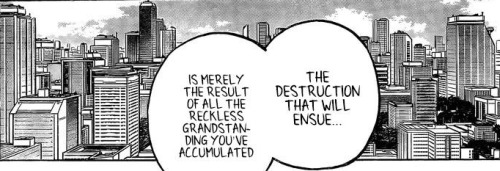
People aren’t protecting people, but rather the structures in place. The structures that are in place, currently as they are benefits people like Endeavor. Endeavor is successful by all marks of society. He has a high case rate of solves, he is wealthy, he has enough influence to throw around that he can fast track his kid to the best school possible. Endeavor is what society tells us a good, successful person is like, but we know he’s rotten as a person.
The society that Shigaraki talks about is already broken. It’s just the people who feel the most effects of society’s broken nature, are its biggest victims. Society already broke for Shigaraki, it already broke for Dabi, it already broke for Himiko. Deku and friends can pretend everything is fine and wipe everything under the rug because they haven’t suffered that way. Even those who have like Shoto mostly keep quiet about their situations. Shoto’s path so far inside the hero system has been conforming with what his father wants of him, interning at his agency. Even those who genuinely have been hurt exist in an environment that encourages them to keep their hurt feelings quiet for the benefit of everyone and conform more. Everybody always telling Shoto what a good hero his father is, and generally being completely ignorant of what his father did to him, even people like All MIght, is a pressuring force that tells him to ignore how the system has failed him. Deku is surrounded by people who either haven’t been victimized at all or who are “good victims” which are either completely innocent children who present an uncomplicated image of an abused child to be saved. (Here’s a hint most real-life abused children act nothing like Eri, a lot of abused children develop violent tendencies, lash out, and act out because the violence they’ve endured literally stunts the growth of their brains). Or the people are “good victims” who like Todoroki Shoto still try to become heroes even when the hero system has failed them. Deku has no reason to question his actions or the actions of the people around him because as long as you’re a hero you are on the side the benefits for the most part. People who are secure of their position within their society don’t really need to question the feelings of those who are insecure.
They haven’t been hurt. They also don’t really want to understand the feelings of those who have been hurt. Because, Hero Society is all about protecting institutions, symbols, and not actual people. THIS IS WHY we see something so ridiculous as Endeavor literally hearing “Heroes hurt their own families - my father told me that” and yet, SOMEHOW NOT REALIZING THAT THOSE WORDS APPLY TO HIM AS WELL. Even though that’s literally... exactly what he did.
Not only does Hero Society only try to save good victims, but when Hero Society fails to save people, the bad victims are actively dehumanized and made out to be at fault for their own victimhood. Citation: The many many time's Gran Torino suggested five-year-old Shigaraki Tomura was just born evil, and therefore there’s nothing that can be done.
This is because once again the actual focus of hero society is not in addressing problems, but rather blaming the ills of society on a few problem elements. If we could just get rid of those baddies who are causing problems for everybody else society would be fixed.
So people like Twice are forced into impossible situations.
His parents are killed by Villains.
He’s fired from his job even though he was obeying traffic laws and the person he hit wasn’t.
He ended up homeless on the street as a teenager.
What was Twice supposed to do then? Starve to death? Victims are put into impossible situations where retaliation is really their only option, and then they’re blamed for retaliating. Then those victims get punished. The society acts like the problem is solved, but it’s not because the society is still broken. It’s still letting people fall through the cracks. AND DON’T GO ‘NO SOCIETY IS PERFECT.’ A few social programs would have helped Twice a lot more than putting on a costume, calling him a villain, and punching him did in the end. Everyone is so in love with the idea of heroes they don’t try to fix what’s right in front of their eyes. The problem isn’t that society is not perfect. It’s that everone would rather ignore the problem, rather than address it and try to solve it.
Deku’s biggest strong point is his love of heroes. His biggest flaw is his love of heroes. He is completely uncritical of the current system of heroes. Yes, he’s fifteen so it’s obvious he might not know better but there are times Deku shows a surprising lack of empathy. He just cuts it off if he’s facing a villain. Like for example here’s Koichi acting like a decent person.
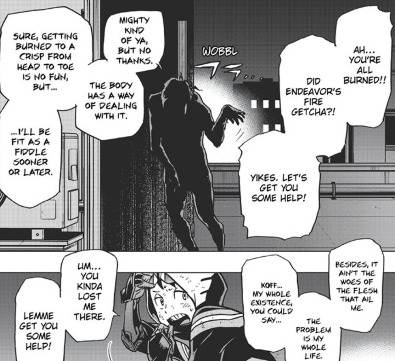
O’Clock was trying to hurt Koichi, and yet when he sees the horrible condition that O’clock II is in, his first response is to ask if he’s okay, and ask him if he needs help. Because you know... he’s still a person? Even if he’s a bad person having half of his face burned off means he’s in horrible pain and he still needs help?

Deku is just like the old lady we’re shown in Shigaraki’s flashback. He believes in heroes so much, he’ll ignore the suffering of somebody right in front of him. Is Deku obligated to sympathize with Shigaraki? I guess not, but Koichi does with O’Clock even while the other is barking threats at him.
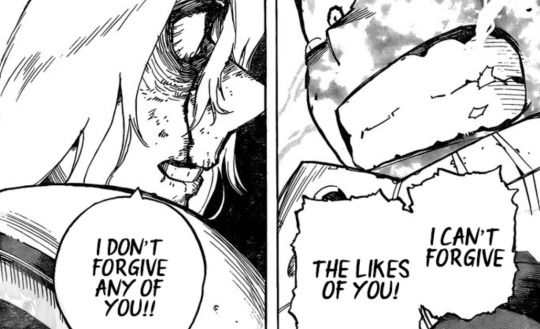
Deku’s naivete can hurt people even though he wants to help people. Deku declares that Shigaraki is unforgivable. However, Deku also before this arc started already seemed to have made up his mind to forgive Endeavor.

Endeavor is system APPROVED TM and Shigaraki is not. Deku divides people into good or bad people, and then doles out sympathy depending on who he thinks is deserving of it or not. Deku’s own prejudices are highly reminiscent of the way hero society functions as well. AND DO NOT BRING UP GENTLE. GENTLE was only going to crash a school festival. That’s like making Deku out to be a saint because he didn’t think a person who J-walked was evil.
Deku’s blind naivete can hurt people too. How much did Deku’s careless words hurt Natsuo? It’s not that Endeavor needs to be forgiven. Endeavor has already been forgiven. He’s never been held accountable for his actions.

Instead of Endeavor being held accountable for his actions, Natsuo is continually made out to be the bad guy for not forgiving Endeavor and moving on with his life. Instead of directly addressing the abuses, victims are instead silenced and told to move on with their lives.
The reason I bring up Natsuo as a point is that even people who aren’t harming anybody, are made out to be the problem. People around Natsuo constantly imply that he’s the one disrupting the household. This behavior of telling victims to remain quiet, HURTS EVERYONE EQUALLY even those who don’t react in extreme ways like Dabi, Himiko, Shigaraki.
Deku will never be able to sympathize with people like Shigaraki because he hasn’t seen what they’ve been through. Shigaraki however, has been just like Deku saving people all this time.
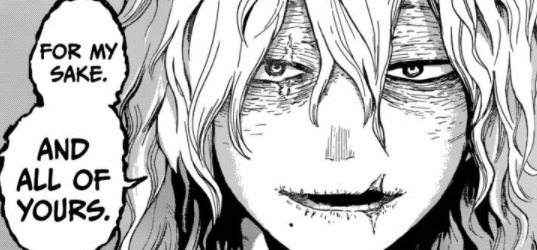
It’s Shigaraki who has been getting close to the people hero society wouldn’t save, who’d never try to save, and saving them all along. Deku’s flaw, that he’s too naive to save the people who most need saving is Shigaraki’s feature. Shigaraki’s flaw that he can’t see a better world beyond all the destruction is Deku’s feature.
Deku won’t challenge the world that is currently in place.
Shigaraki won’t try to do anything to build, he just wants to destroy and be done with it.
Deku protects.
Shigaraki wants to protect but only thinks he’s good for destruction.
They both only carry half of the answer with them. A better world can’t be built with the old world still in place. A better world can’t be built if your only focus is on destroying the old one, and not on healing.
Shigaraki and Deku are woefully incomplete as heroes without one another.

The story between Shigaraki and Deku will end not with two brothers killing each other, but with two brothers reconciling.
The thing is...
The chant isn’t. “All for One.”
Or. “One for All.”
It was never about one answer being the best way to do things.
The chant goes “All for One, and One for All.”
It was always both.
Both Shigaraki and Deku.
This story has two heroes.
#mha meta#shigaraki tomura#midoriya izuku#my hero academia meta#my hero academia#my hero academia theory#bnha 281#bnha 281 spoilers#mha 281#mha 291 spoilers#shigaraki meta
818 notes
·
View notes
Text
Okay I just need to go on a rant about Whirl because I love him he might just be the most tragic character in the entirety of MTMTE and considering the candidates that’s a pretty hard position to cinch. Some of this is gonna have mentions re: self harm, suicidal tendencies/ideation, overall bad coping mechanisms etc so if that’s not your cuppa please scroll on.
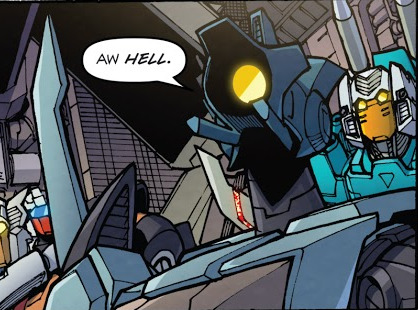
This gets long so here’s the obligatory read more.
Let’s write “tragic” in flickering neon letters with the fact that Whirl’s first appearance in MTMTE, dropping the titular “how to say goodbye and mean it,” is a personal soliloquy delivered as he’s in the midst of constructing his own funeral pyre. Whirl is lost, directionless, trapped and unwilling to be such in a postwar environment. But how did we get here?
Whirl is without a doubt a driven character. In the prewar functionist society, he had no qualms switching careers, risks be damned. Whether he’s always had a knack for disobeying authority or was simply driven by passion or both isn’t elaborated on, but he’s got a hell of a hardheaded streak that’s impossible to ignore. When destroying his business wasn’t enough to deter him from further rebellion, the Senate was happy to turn him into an empuratee and destroy not only the opportunity but the capability of continuing to rebel by pursuing his passion. This is what I’d personally consider the big ‘whump’ moment, less so the use and abuse as a pawn that followed but the point of trauma at which we begin to see Whirl’s psyche begin to twist.
From this point forward we see Whirl in and out of prison, let loose when he can be useful to someone else’s ploy and otherwise incarcerated for a buffet of offenses. No longer able to be constructive and having little if any control of his life, Whirl becomes aggressively destructive. In response to having everything he aspired toward ripped away from him, permanently, he builds a mental defense of bitterness and anger and paves over his black hole of self worth with a veneer of outright assholery. It’s here that he bares his metaphorical fangs and pushes - with gusto - anyone who might even suggest they’re trying to appeal to reason or get close to him as an individual.
It’s hard to imagine, given even subtly different circumstances, that Whirl would not side with the decepticons for the war. While he’s single-handedly responsible for radicalizing Megatron towards violence, the ‘con intent at the start of revolution - that movement in society should be possible and a caste system based on alt mode is unethical - aligns quite nicely with what he’d already aspired to do with his life. His conscription to the side of the autobots is just another instance in which his autonomy is cast aside.
Whirl is a tool. Whirl had a passion for watchmaking, but now he can’t, so his new passion is violence. Whirl is a gun and someone else has always told him where to point and all he’s ever been given for his cooperation is the blame of pulling the trigger. Whirl is an asshole, Whirl is unpredictable, Whirl isn’t a mech anybody would ever think twice about saving - the answer would always be no. Whirl wants to die. Whirl only wants to die on his own terms and he’ll be damned if he’s going to keel over under the orders of someone he doesn’t respect, for a cause he doesn’t believe in.
A few years of this sort of treatment would be enough to drive anyone insane, let alone the millennia of warfare he suffered through. Worse yet is the one time he found a group, a team that was known for the unorthodox and taking on the big messy challenges, the Wreckers kicked him out. Whirl was too much for the mechs that were too much and there’s no way in hell that doesn’t still sting.
That’s how we get here:
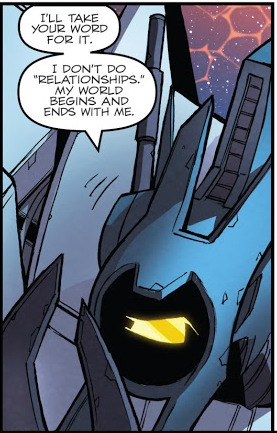
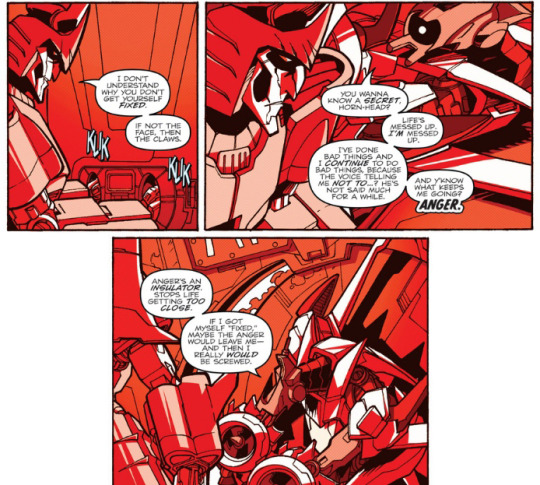
Whirl defends himself through isolation from others. He can’t be hurt by others if he never lets them close enough to be hurt by. In a hypersocial society, he has no close long-term friends, he is one of the few with no roommate aboard the Lost Light. He made himself as unpalatable as possible. He’s crass, he’s volatile, he makes it clear with every word and action that Whirl is first, you don’t mean anything, I’d leave you for dead in an instant..... But that’s not true, is it?
Whirl is shown being completely, dramatically, self-destructively caring throughout the series. Between risking his life for the scraplet colony disguised as a protoform, participating in an untested spark jumpstart to save a life, coming up with a plan to rejuvenate Tailgate’s spark, and performing a spark transplant surgery on Megatron - without whom the world would never have been even a fraction as cruel to Whirl as it had been - Whirl is far from the most selfish character in the series. It’s in his nature, however, to deny such, to the point where he more than likely believes his own narrative that he’s irredeemable, self-absorbed, invincible, degenerate, and neither capable nor deserving of close interpersonal relationships.
It’s also how we get here:
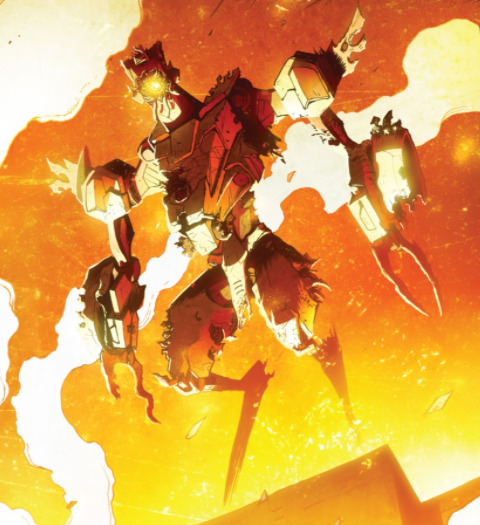
Whirl is one of the characters that we more frequently see in a state of disrepair. He fights passionately and recklessly, with no regard whatsoever to whether or not he makes it out of a scrum with all his limbs intact. Injuries like these, and those that he experiences elsewhere in the series, would put other mechs out of commission through pain alone, but as long as Whirl is conscious he doesn’t stop until the fight is over.
As depressing as it is to think that Whirl is simply at this point accustomed to extraordinary pain, it’s even moreso to think about the more likely concept that he wants to be hurt. Whirl doesn’t have control of a lot that happens to him, but do you know what he does have control of? Who he chooses to shit-talk. More often than not we see Whirl being blatantly disrespectful of his superiors, and some of the more dangerous mechs aboard the LL. While obviously his intent when insulting Ultra Magnus isn’t to start a fight, harping on Drift (and subsequently getting cold clocked) or Cyclonus is a little more self-destructive in nature.
While Whirl has been in therapy, we see during the encounter with Fort Max that he’d shared very little of what he actually considered traumatic with Rung. With no material to work with, Rung wouldn’t have been able to give Whirl instructions or advice as far as a healthy coping mechanism, and so I’m firmly of the belief that Whirl goes out of his way to get himself hurt as a way to have a vague sense of control.
On his actions and guilt:
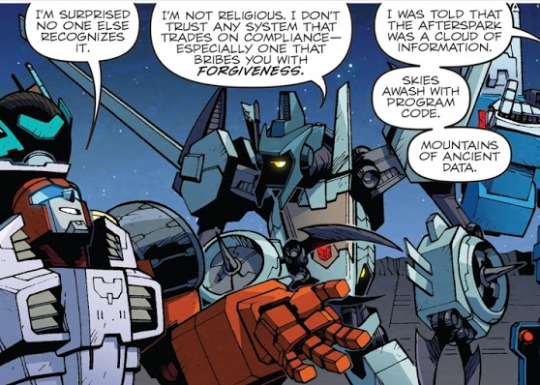
Whirl is immensely guilty. When he’s overcharged, he admits that everything feels like his fault - and unfortunately a lot is. Whirl believes he’s the bad guy, and he’s willing to take the fall for actions that others might find immoral. There’s a lot Whirl has done that he’ll likely never forgive himself for, even if he garnered the ability to start forgiving himself for the small things, but the character he’s created for himself has been part of him for so long that it’s near impossible to tell where to draw the line between caricature and his genuine self.
At this point in time, Whirl is not capable of improving himself without external assistance.
He has accepted (however wrongfully) that he is not cared about, trusted, wanted, or respected.
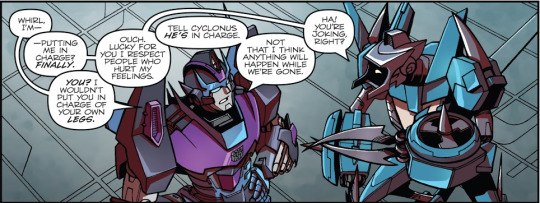
His assumptions become self-fulfilling prophecy as he - consciously or not - works to perpetuate his image. Whirl is a dick, he’s unfazed by anything anyone says about him, if someone is insulting him they’re probably right, why bother arguing unless it’s with the intent to get in a fight? He doesn’t pay attention to others, he doesn’t pay attention to himself, nothing that anybody could say could possibly make a difference.

Right? Right?
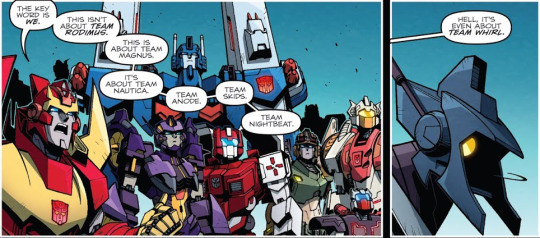
Wrong. Part of what makes Whirl so heart-wrenchingly tragic is that it is so incredibly clear that nobody has ever told him he mattered. Rodimus throws out what could be interpreted as a snide remark, “even the crazy bastard makes a difference,” and that aside sticks with him. Millions of years of warfare, of being a tool to use, an expendable soldier, a rabid dog to throw at their enemies, and not once did someone turn around and say he was anything good. He’s been thanked for saving lives, for contributions, for individual acts, but his reaction to Rodimus really cements in my mind that nobody has ever said that he, that Whirl, was important.

Whirl is a broken character. He’s subsumed by his own self-hatred that he perpetuates and justifies with a mask of cruel indifference and aggressively abrasive snark. He’s alone, by what he thinks is his own choice but is really a horribly misguided attempt to keep himself safe. He’s got no potential for growth unless someone wants to force their way through his defenses in order to help him find the line between who he is and who he pretends to be in order to keep from being hurt. Whirl is terrified of abandonment, and guarantees that nobody will ever be able to leave him by never letting them come close to begin with. He’s not a good person, he’s violent and callous and has little regard for the consequences of his actions, but he is that way because of the life he was forced to lead. He falls into consistent patterns because he craves control, even if those patterns are self destructive. It’s proof of the little growth he was allowed during the course of MTMTE/LL that after their quest was over, he didn’t attempt suicide again but instead got into the revolving door of incarceration for petty offenses.
All in all, Whirl is one of the saddest characters in any media I’ve consumed and please someone get this despicable bastard helicopter a new therapist and a stiff drink
287 notes
·
View notes
Text
Trauma Holodeck - Adora’s Apology
...since I’ve covered a S5 apology (and what made it legitimate), I might as well give Adora’s apology in S1E11 (Promise) the same treatment.
So let’s cover what Adora has to apologize for. Because the bulk of this episode is Catra naming her hurt - having all the shards of pain that Adora and their relationship have caused her brought up and laid bare via the Trauma Holodeck.
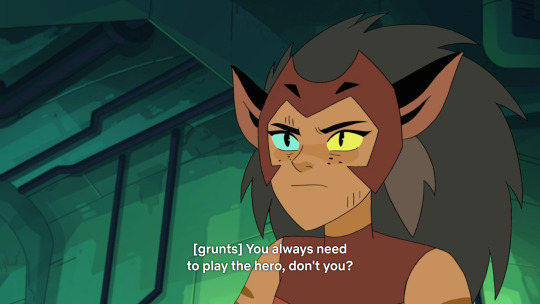
Adora always has to play the hero - Adora derives validation from being the one who swoops in and fixes everything, even when that diminishes and denies Catra’s agency.
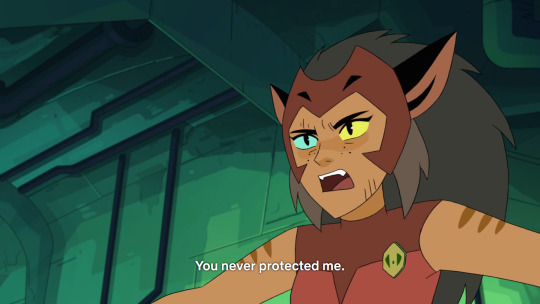
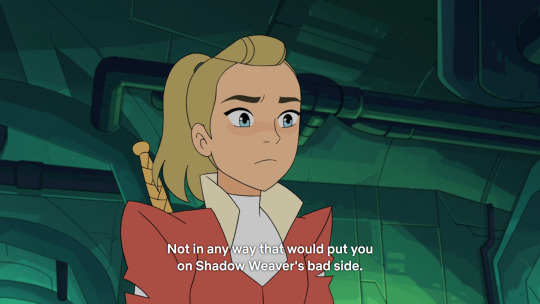
Adora repeatedly prioritizes her own need for external validation over Catra’s well being.
Now - and I don’t think either of them have fully come to terms with it, even as they both dimly see the shape of it - Adora ultimately never had the power to protect Catra. Making her think she did - that she could change, and thus was responsible for, Shadow Weaver’s abuse - is one of the great harms done to Adora.
But that in no way erases the fact that Adora uses "protection” as a justification for controlling Catra. Even if her protection had been in some sense real, it would have still been controlling and harmful.
And that is Catra’s complaint here.
It’s not “You never protected me [and I needed you to]!”
it’s “You never protected me [, stop using it as an excuse]!”
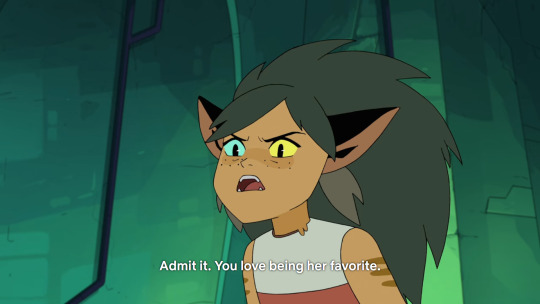
Adora loved being Shadow Weaver’s favorite - Adora wanted (needed) the validation she got from Shadow Weaver, just as she needed to believe that it was real and valid and earned.
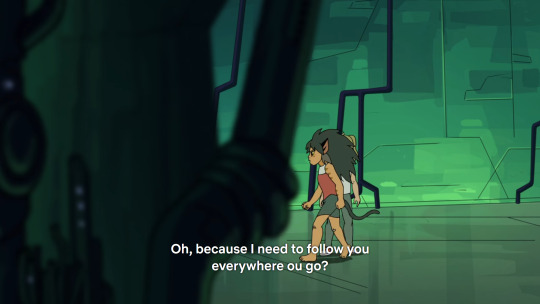
Adora expects Catra to follow her, to listen to her, to do what she says.
This is the toxic tangle sitting at the core of pre-series/S1 Catradora relationship - that, however much they love each other, their relationship has been, for years, one where Adora hurts and controls Catra, and insists that it’s for Catra’s own good. Where she believed that Catra needs to be controlled and saved from herself.
It’s a relationship where Adora denies that she derives value from it, and, indeed, denies that she has needs and wants at all. Where she inhabits a fiction that everything she does is selfless and in service to the Greater Good, and thus cannot be questioned.
And Adora meets these absolutely true complaints with denial and deflection.

Pretending she got nothing from being the one who "saves” Catra, even as she is angered by Catra not being grateful like she’s supposed to be.
(Adora is deeply shaped by Shadow Weaver’s conditional affection - it drives her constant need to prove herself, to earn her place in the world and the hearts of her friends. But it also means that she expects to be rewarded with affection when she “does good”. She believes that if she saves Catra, Catra is obligated to love her.)

Deflecting to talking about Shadow Weaver, rather than addressing her own failure (and ultimate inability) to protect Catra, or the controlling behaviour that spun out from it.

Flatly lying that she didn’t value or actively pursue Shadow Weaver’s praise and favoritism - because she cannot confront how she uses that in place of an internal sense of worth.
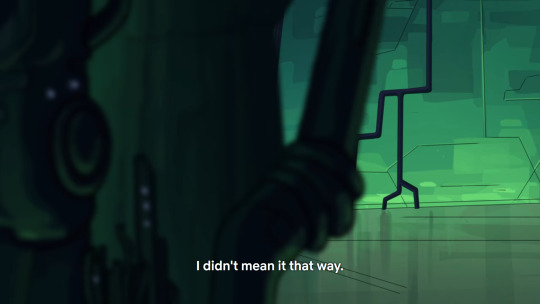
Denying the plain fact that everything she has said in this episode is about how she didn’t want to leave Catra, about how she wants Catra to join her The Rebellion, about how Adora wants Catra back for Adora’s sake. That she absolutely did mean it that way.
Adora actively rejects, not only accountability for her role in their dysfunction, but the very idea that their dynamic had a problem - that she was an active participant in Catra’s harm, that merely walking away from Shadow Weaver was and is insufficient, that she wasn’t the hero she thought she was.
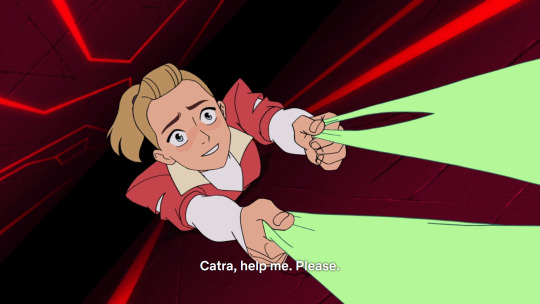
Adora thinks that if she just denies hard enough, all of these things will cease to be true - that Catra will once again fold and rejoin her in the fiction that everything is fine and nothing has to change.
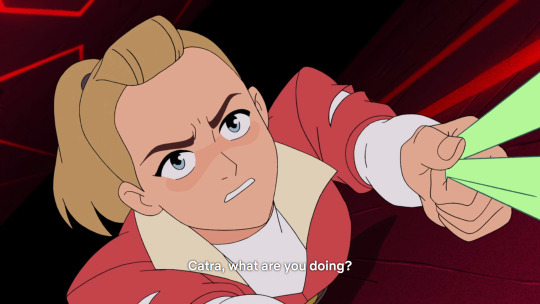
And oh, she is angry when that doesn’t work. Angry and threatening. Angry and threatening, and echoing Shadow Weaver’s conditional affection.
“Catra, what are you doing?” Adora isn’t going to love you anymore if you keep that up, Catra. Better fall back in line, Catra.
(Yeah, Anger isn’t Abuse - that’s as true for Adora as it is for Catra - but the rest of this? The threatening, the withdrawal of affection? Oh boy.)

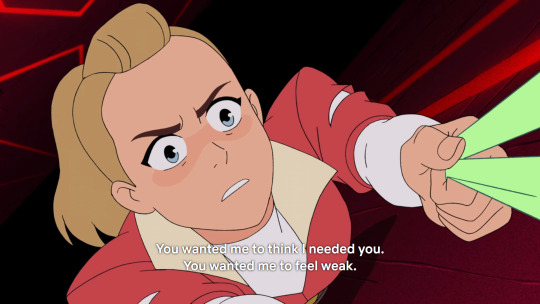
But that fails, too. Because Catra has realized that Adora benefits from her harm. That Adora is not listening to her, not because Catra isn’t explaining herself well enough, but because Adora doesn’t want their relationship to change. That Adora wants to be Catra’s hero far more than she wants Catra to be happy.
Catra no longer fears losing Adora’s affection, because Catra has chosen to finally, fully leave her.
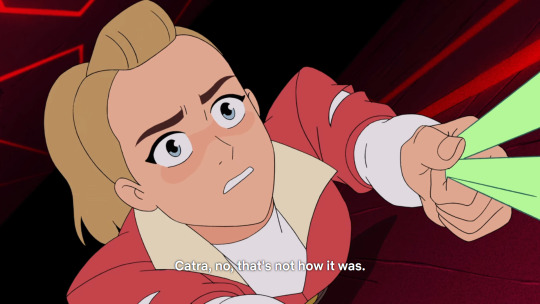
There’s one final, desperate round of denial.
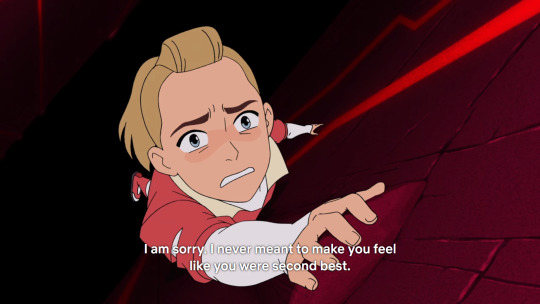
And it’s only when that fails, when Catra has already cut her loose (🌈 metaphors🌈), that Adora finally apologizes.
And, oof.
Let’s review the qualities of a legitimate apology:
Taking Ownership - They are apologizing for their actions
Acknowledging Harm - They are acknowledging and centering the harm caused to the other person by said actions
Remedial Action - They are taking active steps to repair the damage they have caused, and to be better going forward.
Sincerity - The apology is offered for the sake of the person being apologized to, not for the benefit of the apologizer.
And let’s step through them.
Taking Ownership
“I never meant to make you feel like you were second best.”
Adora apologizes, not for her actions, but for Catra’s feelings - placing the fault in Catra’s emotions, not Adora’s behaviour.
Acknowledging Harm
“I never meant to make you feel like you were second best.”
She centers, not the harm Catra suffered, but her own intent and guilt - and by doing so, denies Catra’s framing. In a bit of verbal slight-of-hand, she has replaced the complaint that her control is undesired and intrinsically harmful with the idea that she has merely erred in how she used that [illegitimate] control.
(It’s also a lie. Adora knew perfectly well she was trapping Catra in a perpetual second place.)
Remedial Action
“I never meant to make you feel like you were second best.”
Nothing is actually being fixed here. Adora has made no attempts at remedial action, provides no explicit promises going forward - and, because she altered the framing, her implicit promise is not “I will let you make your own decisions”, but is instead “I’ll make the right decisions for you, going forward.”
Sincerity
Adora is literally only apologizing because every other trick in her bag has failed. She is apologizing, not to help Catra, but as yet another attempt to “reset” their relationship, to go back to the way things were, even in the face of all the harm it caused to Catra.
Adora is 0 for 4. This is a bad apology.
89 notes
·
View notes
Text
Your basement in Nibelheim: Unpacking the new themes of Final Fantasy VII Remake
The story told by Final Fantasy VII Remake is a reconfigured one. It tweaks, adds, and cuts the original's narrative in ways that seem designed to bring something new and unanticipated to the experience. However, these alterations are neither random nor incidental. They follow deliberate themes and patterns in the same way a completely original story might. Though not as readily perceptible, the Remake has a coherent outlook that it expresses most clearly through changes to the original narrative. All of its major changes are expressions of internally consistent concerns, albeit ones that differ dramatically from the original’s. By examining the principles underlying those narrative changes, we can understand the thematic axis along which they have been made and the message the Remake ultimately expresses.
Spoilers for everything follow.
Good guys good, bad guys bad
The first major narrative change appears at the end of the first chapter. At the culmination of Avalanche's mission to bomb the Sector One reactor, we see Shinra was actually responsible for the subsequent massive explosion that claimed many lives. The bomb brought by Avalanche was several orders of magnitude smaller, only enough to destroy a few pipes.
In the original game, the opening bombing mission serves as a moral orientation to the world, and as a keystone event by which that morality will later be re-evaluated. Avalanche examines the justness of their actions as early as a couple hours in and is confronted about them directly as late as forty hours onward. The moral ambiguity they express is echoed in many situations and characters in between, from the conflict between Dyne and Barret, the addition of Shinra kidnapper Cait Sith to the cast of heroes, and your frequent run-ins with the openly amoral but otherwise amicable Turks. The cast is a self-interested one and the world they navigate is tangled, often without a clear or righteous path forward.
In the Remake, Avalanche is never made aware that they aren't culpable for the explosion of the Sector 1 reactor. In fact, they agonize far more about the loss of life they are no longer in any way responsible for. In doing so, they enact a kind of moral pageantry - we as players have already been assured of their innocence and each time they question themselves, we are only further reassured that our heroes are fundamentally good. The world of the Remake is morally uncomplicated, and any character it expects you to extend sympathy towards will voice their conscience clearly, up to and including the Turks before they drop the Sector 7 plate.
The corollary is that the villains have become morally uncomplicated. They no longer have any need for the sort of rumination that is regularly employed to reassert that the good guys are good. Sephiroth illustrates this with particular clarity. In the original game, Sephiroth is morally reprehensible but easy to understand and empathize with because we participated in the reflective journey of self-discovery that ultimately made him a monster. His turn toward annihilation is the highly motivated result of coming face to face with the truth about the impact Shinra has had on his life - in other words, roughly the same thing that drives the cast of heroes.
He also expresses his goals in the same terms as Avalanche, orienting his actions around the hypothetical good of the Planet. There is an implicit condemnation of Avalanche's heroism embedded in Sephiroth, who clearly understands himself to be righteous. As the primary antagonist, Sephiroth is the most fleshed out, but most of the villains with any degree of screen time illustrate their own complexities. The shallowest among them, President Shinra, is summarily killed off in the opening act.
But the Remake is not a morally murky world, and neither is it's incarnation of Sephiroth. His motives are either inarticulate or entirely absent as he appears throughout the story at regular intervals to menace Cloud for menacing's sake. Evil is now one of his innate qualities, the same as President Shinra’s, and adding purpose to his actions will only muddy the waters. While Tifa wrings her hands over the harm she may be inflicting by turning off Sector 4's sun lamps - a surely temporary measure - Sephiroth antagonizes Cloud for no reason in particular. Shinra's newfound culpability for Avalanche's bombing has similarly flimsy and inconsequential motivation. Ultimately, nobody's reason really matters; the point is simply to display their moral character, which is always exactly as we anticipate it.
Cloud may flirt with selling his friends out for gil and Barret may wish to kill President Shinra, but neither will follow through because they are Good, as solidified by their intention. Even Cait Sith appears to sorrowfully witness the plate dropping, thus absolving Reeve for his complicity by proxy. Bad outcomes are the result of bad actors with bad intentions. The good guys may feel conflicted and responsible, but no harm can truly come from them. Otherwise, what's the point of bad guys?
Sadness is unnatural
The point of bad guys, if you're wondering, is to bring harm, suffering and loss.
The penultimate boss of the Remake is an incarnation of the Arbiters of Fate, a newly introduced concept. Ghostlike beings known as Whispers appear regularly throughout the story, often during familiar scenes from the original game, interfering with events to keep them "on track." Before the main cast squares off against their ultimate manifestation, Aerith and Red XIII explain that the Remake's Planet is one with a fixed destiny, and these creatures are its enforcers.
"But this isn't how it's supposed to be," Aerith tells us, which is the point to their presence in the first place.
Over the course of the Remake, it becomes apparent that she anticipates certain plot points of the original game, and in particular her own death. This is a point that Cloud seems to remember, albeit vaguely, as well. The implication of the Whisper's presence and Aerith's dialogue about defeating them to "put things right" supposes that the original game's most famously sorrowful moment was the product of interlopers, working on behalf of fate.
To be clear, destiny is not the point of the Whispers. The point of them is that they create outcomes, and the undesirable ones can be changed through their defeat. This is further underscored by the ending of the game following their defeat, in which we see Zack, Biggs, Wedge and Jessie's deaths undone.
Final Fantasy VII was a game very informed by loss and uncertainty. Aerith's death is memetic for how shocking it was, yes, but in its original context the shock comes from the suddenness and permanence of the loss. More sorrow follows, as Cloud breaks down completely and Meteor is summoned. It hangs in the sky over the last act, the physical manifestation of a pall that Aerith's death cast over the game. Even as we approach resolution, the game underscores the uncertainty of life as one of its key themes - no one can be sure whether Holy will work or not, and if it does, what effect it might have on humanity as a whole. Mortality is a neutral and inescapable fact of life.
The sad things that happened in Final Fantasy VII largely did not happen because a being or force made them happen. The most attributable tragedy is Aerith's death by Sephiroth's sword, but her death was unique in the broader media landscape in that it's purpose was not to rally the heroes against the villain. It was to convey the suddenness and pointlessness of the death of a loved one - how abrupt and unjust it is to lose someone. Hollywood-style farewell speeches were deliberately eschewed for a more realistic and sobering finality. Cloud's emotional reaction and Aerith's funeral are the focal points of the scenes that follow.
When things happen for a reason in Final Fantasy VII, the long arm of consequence is usually at play. Most tragedies in the game, including those wrought by Sephiroth, trace their origins back to the Shinra Electric Power Company. There is no fixed destiny, only the culmination of callous decisions made in hubris, greed and self-interest. All suffering wrought by Shinra pays dividends, but the only organizing point to it is that inhumanity and cruelty are self-perpetuating cycles, all the more difficult to escape once you are caught up in the pain of them. Thus, learning to deal with the pains of life truthfully and gracefully is a vital endeavour. Their ability to do so is ultimately what marks Avalanche as the heroes of this story.
The Remake does not believe in the random cruelties of the universe and is not much interested in depicting them either. Death is a markedly different affair. When it happens to Biggs and Jessie, neither can be sent off without a farewell speech delivered against stirring strings. The people in the Sector 7 slums largely escape their pointlessly cruel death. Aerith's death is reconceptualized from a tragedy to a universal wrong needing to be righted, something that never could have happened if things had gone the way that they were supposed to. Loss and sorrow and suffering are not a part of the natural fabric of this universe, but aberrations visited upon it by external actors.
This is why it all must be "put right" by bringing back Zack, Biggs, Wedge and Jessie, and by implicitly averting Aerith's death. Suffering can be avoided through direct physical confrontation with whoever bears the blame. Obviously this means Sephiroth, who is actually responsible for Aerith’s death and has no other narrative reason to fight you, but it also means the Whispers. The concept of Fate is a stand-in for your prior intuitive understanding that Aerith and Zack’s death are integral and unassailable parts of the story Final Fantasy VII was trying to tell. Loss is not so inevitable after all.
It's all about you
Of course, there is another dimension to Aerith's impassioned plea to defeat fate and set things right.
The Whispers aren't an emotionally engaging concept. The rough idea of destiny doesn't really make for good table stakes. Their meaning is only revealed at the eleventh hour, so why should you care whether or not the events of the universe are on the rails when none of the driving action in the past 45 hours has suggested you should? The answer, of course, is that you've played this game before.
The glimpses of a predetermined future and the sadness that must be defeated aren't really concerns of the characters - the "future" that needs to be defeated is in your memory. This game was written for returning players almost exclusively. Sephiroth's every appearance and the Whispers every interference hang on your foreknowledge of what is about to happen. The climax of this game is a confrontation with the most culturally enduring feeling it inspired. Namely, sadness - and sadness at Aerith's death in particular, one that fans begged for an aversion to in the many years that followed.
In one of the most memorable sequences of the original Final Fantasy VII, we're given an up-close view of Sephiroth's becoming as he transitions before our eyes from ally to villain. What happens to Sephiroth is often colloquially described as a break from reality but is better understood as a deliberate reordering. Faced with a reality he can't accept, Sephiroth reconfigures his perception of the world. His new worldview places himself and Jenova at the center, where good and evil are stark black and white and he has no more need of pain. His role is to be the chosen hero, so what is there to be sad about? Later, the same Nibelheim basement provides the site for Cloud to forget himself and undergo his own reconstruction of identity.
The world of the Remake has undergone a similar reconfiguration, but it's not Sephiroth at the center - it's you. The Remake is an incarnation of Final Fantasy VII adjusted to accommodate your hazy memories of it. But no such project can truly tailor itself to the particular and personal memories and experiences of someone engaging with a story for the first time. It engages instead with the cultural memory - evident in the emphasis on rectifying Aerith and Zack's deaths - and rounds out the rest with one key assumption about who you were when you first encountered Final Fantasy VII.
Specifically, that you were a child.
That you remember the good guys being good, the bad guys being bad and the sad parts being sad. The complexities and nuances beyond those points were difficult to grasp. To include them in the Remake would be to transgress upon your memory of the original story. The clear political and philosophical voice of the original might feel intrusive and awkward now that you are old enough to meaningfully disagree with it. The Remake wants to surprise you, but not disrupt you. "Nostalgia" is usually the word people reach for but I think even more apt in this case is "comfort."
The Remake is a comfort game, and as you sit in your proverbial basement and devour it, it tries to tell you what it thinks you want to hear. It supposes that your memory of the original, however detailed, is emotionally and intellectually straightforward, and aims to remake its story from that memory rather than from the meaning of the original game.
Engaging directly with the player's hypothetical and emotionally charged memory is the culmination of the Remake’s first episode of the Remake because it is the point of that episode. Built on acknowledging and reinforcing the memory of the player, the game naturally ends differently. The childish memories of the player is the primary concern of the Remake, and the finale naturally rearranges itself into a tacit promise to fulfill equally naive dreams that never came true in the original.
Illusions of Nibelheim
The net result is that the Final Fantasy VII Remake tells a story with a very different meaning and focal point than Final Fantasy VII, and in fact an often antithetical one. This is not surprising, as their philosophical foundations differ vastly. Where Final Fantasy VII was concerned with human mortality, changing identity and locating ourselves in a broader environment, the Remake is concerned with reflection and personal recollection, and in particular how those reflections are distributed across two very different points in time (time - a theme we are likely to see plenty of as the Remake saga continues on). The original looks outward, and the Remake looks inward.
The striking difference between the two calls to mind another of Sephiroth’s scenes in the original, the one that forms the cloth from which his every appearance in the Remake has been cut. Taunting Cloud and Tifa, he conjures an illusory burning Nibelheim and confronts their faulty memory of the events that transpired there. Sephiroth’s point is this: “What I’ve shown you is reality. What you remember, that is the illusion.”
It’s an illustrative example of the gulf in meaning between two works we once believed were intended to tell the same story. In the Remake, memory is the foundation of reality. In Final Fantasy VII, memory is precious, but deeply unreliable, and never preferable to truth.
#final fantasy vii remake#ffviir#ff7 remake#final fantasy vii#ffvii#ffviir spoilers#final fantasy vii remake spoilers
338 notes
·
View notes
Text
Human Rights and Veganism
I speak frequently about my passion for human rights and how this is often dismissed by nonvegans on the basis of me being vegan, and seeing how many other vegans have related to my struggles, I thought it would be useful to compile a list of the human rights issues animal agriculture is responsible for and/or perpetuates. This will not be a list that 100% encapsulates the extent to which human rights are violated by these industries, but I think it is still a really great introduction, if nothing else, to how ubiquitous the oppressive nature of animal agriculture is. This post will be mostly guided by links to sources and some key quotes and phrases from those sources.
1. Slaughterhouse Workers
Slaughterhouse workers are one of, if not the most, abused, mistreated, and neglected groups of workers to exist within western countries. The traumatization they face as a result of their job is often ignored by almost everyone who is not vegan or who does not research the topic.
“A Call to Action: Psychological Harm in Slaughterhouse Workers“
“These workers perform a job that, by its very nature, puts them at risk of psychological disorder and pathological sadism. This risk emerges from a combination of many factors of slaughterhouse work, one of which is the stressful environment that slaughtering creates. A large portion of this stress comes from the exceptionally high rates of injury among the workers.
“However, slaughterhouse work is unique among major industries due to its innate violence...one of the most prominent studies investigated the impact of having a slaughterhouse in a community on crime rates within that community, using this as a metric for psychological health... Though the industries they used for comparison were nearly identical in other predictors of changes in crime (namely worker demographics, potential to create social disorganization, and effect on unemployment in the surrounding areas), slaughterhouses outstripped all others in the effect they had on crime. They led not only to a larger increase in overall crime, but, disturbingly, disproportionate increases in violent crime and sexual crime.
“Creating and sustaining oneself with “good” moral character and having another self that can mechanically end lives for hours each day not only serves as another source of psychological stress for workers, but exposes workers to the risk that their pathologically un-empathetic work selves will slip into their community lives. This is another explanation for the “spillover” that affects slaughterhouse workers’ minds and communities.
“Living with the knowledge of their actions causes symptoms similar to those of individuals who are recipients of trauma: substance abuse, anxiety issues, depression, and dissociation from reality.
(Testimonies from slaughterhouse workers): “And then it gets to a point where you’re at a daydream stage. Where you can think about everything else and still do your job. You become emotionally dead.”
“So a lot of guys at Morrell [a major slaughterhouse] just drink and drug their problems away. Some of them end up abusing their spouses because they can’t get rid of the feelings. They leave work with this attitude and they go down to the bar to forget.”
Confessions of a slaughterhouse worker
There are things, though, that have the power to shatter the numbness. For me, it was the heads.
At the end of the slaughter line there was a huge skip, and it was filled with hundreds of cows' heads. Each one of them had been flayed, with all of the saleable flesh removed. But one thing was still attached - their eyeballs.
Whenever I walked past that skip, I couldn't help but feel like I had hundreds of pairs of eyes watching me. Some of them were accusing, knowing that I'd participated in their deaths. Others seemed to be pleading, as if there were some way I could go back in time and save them. It was disgusting, terrifying and heart-breaking, all at the same time. It made me feel guilty."
I know things like this bothered the other workers, too. I'll never forget the day, after I'd been at the abattoir for a few months, when one of the lads cut into a freshly killed cow to gut her - and out fell the foetus of a calf. She was pregnant. He immediately started shouting and throwing his arms about.
I took him into a meeting room to calm him down - and all he could say was, "It's just not right, it's not right," over and over again. These were hard men, and they rarely showed any emotion. But I could see tears prickling his eyes."
I remember one day in particular, when I'd been there for about a year or so, when we had to slaughter five calves at the same time.
We tried to keep them within the rails of the pens, but they were so small and bony that they could easily skip out and trot around, slightly wobbly on their newly born legs. They sniffed us, like puppies, because they were young and curious. Some of the boys and I stroked them, and they suckled our fingers.
When the time came to kill them, it was tough, both emotionally and physically. Slaughterhouses are designed for slaughtering really large animals, so the stun boxes are normally just about the right size to hold a cow that weighs about a tonne. When we put the first calf in, it only came about a quarter of a way up the box, if that. We put all five calves in at once. Then we killed them.
America’s Slaughterhouses Aren’t Just Killing Animals
“I’ve seen bleeders, and they’re gushing because they got hit [by a knife] right in the vein, and I mean, they’re almost passing out,” she said, “and here comes the supply guy again, with the bleach, to clean the blood off the floor, but the chain never stops. It never stops.”
In Texas, where private employers are not required to carry workers’-compensation insurance, Tyson has opted out of the state system completely. When a worker gets injured at the Tyson beef slaughterhouse in Amarillo, Texas, in order to get medical care from the company, that person must first sign a document saying:
I hereby voluntarily release, waive, and forever give up all my rights, claims, and causes of action, whether now existing or arising in the future, that I may have against the company, Tyson Foods, Inc., and their parent, subsidiary and affiliated companies and all of their officers, directors, owners, employees, and agents that arise out of or are in any way related to injuries (including a subsequent or resulting death) sustained in the course of my employment with the company.
The pressure to sign was enormous. When a worker named Duane Mullin had both of his hands crushed in a hammer mill at the Amarillo slaughterhouse now owned by Tyson, a manager employed by its previous owner persuaded him to sign the waiver with a pen held in his teeth.
'We're modern slaves': How meat plant workers became the new frontline in Covid-19 war
The company is now measuring workers’ temperatures as they report for work, and began supplying surgical facemasks, but, according to Fields and workers interviewed by the Guardian, Tyson continues to suppress information on employees who have tested positive for Covid-19.”
One worker, a central American migrant who spoke on condition of anonymity to protect her job, told the Guardian that the company was not enforcing social distancing. 'We are all given bathroom breaks at the same time and there are hundreds of us waiting to use them. There are only seven bathrooms,' she said. 'They [Tyson] don’t care about the worker. They don’t care if we get sick.' A spokesman for Tyson said the company was taking 'several measures' to allow social distancing but did not address the bathroom break allegations."
One African American worker at a Koch facility that had been targeted by Ice, spoke to the Guardian on condition of anonymity. He alleged that while Koch had recently begun taking workers’ temperatures before shifts, they had also withheld details of any workers who contracted the virus.
'They ain’t offering nobody no disability, no unemployment, no time off,' the worker said. 'I just keep my hands washed up, my face covered up, my whole body covered, and I pray to myself and hope I don’t catch it. The truth is there’s a chance that everybody in [here] will catch it.'
The sociologist Lourdes Gouveia has studied the meatpacking industry for three decades and said the Covid-19 outbreak is simply highlighting again the dangerous conditions in processing plants. Gouveia said the industry has perfected a formula which allows it to maximize profit while producing relatively safe meat by resisting regulations and utilizing low cost, mostly immigrant, labor in unsafe conditions. 'All of these elements are of a highly perfected formula or maximizing profits that is unlikely to change fundamentally,' Gouveia said."
2. Environmental Racism and Classism
Animal agriculture, and factory farms specifically, tend to locate their facilities near poor communities (often black or Hispanic) who do not have the financial means to take them to court over the ways in which these farms affect their health and wellbeing.
How Swine in North Carolina Affects real People | René Miller Excerpt
“When you go back and you look at where these hog facilities are located, there’s a disproportionate number of them that are located near communities of color, low income communities. It is definitely a human rights issue.”
“Now see, if you lived here, and saw the way they do, you wouldn’t eat no pork. I don’t eat bacon, because I know where it comes from. When they die, they go into a box, and they decompose because they swell in the heat. A truck come and pick them up, take them to the processing plant in Roseo, ground them up into feed, and feed them back to the hogs.
“It hits you right in the face. Smell like something that you had never smell before. Smell worse than a dead body.”
“When we go to the funeral, he used the spray. If we wanna have a cookout on Sunday, he’ll spray. He always sprays Sunday.
“Do you think it’s also a civil rights issue?”
“Yes, I do.”
When We’re Dead and Buried, Our Bones Will Keep Hurting
Like many other hazardous and exhausting low-wage industries in the United States, this work depends on the labor of America’s most marginalized communities. Most workers in the industry are people of color, many are women, and nearly one-third are immigrants.
In 1983, wages for workers in the meat and poultry industry fell, for the first time, below the national average for manufacturing work; in 1985, they were 15 percent lower; in 2002, they were 24 percent lower; today, they are 44 percent lower. Workers earn, on average, less than $15 an hour.
Jobs in the meat and poultry industry have long been a starting point for many groups of new immigrants to the United States as many positions require little formal education, experience, or English-language skills. In 2015, nearly 30 percent of meat and poultry workers were foreign-born non-citizens—about three times more than the percentage of manufacturing workers nationally.
Even immigrants with work authorization can remain vulnerable to coercion from employers, as many are not aware of their workplace rights, may not be familiar with technical terms in English, or are otherwise hesitant to navigate the complex, and potentially costly, procedures to vindicate their rights. The result is a significant part of the low-wage workforce who are less likely to report workplace abuses or even injuries, and are therefore more easily exploitable than US citizens, for fear of their employers’ power to fundamentally disrupt their lives and the lives of their families. “Us workers are afraid to lose our job,” said Rebecca G., an immigrant worker at a poultry plant in Arkansas. “[P]eople don't speak up or say what's wrong about the chemicals, or the speed of the line, or the discrimination.”
3. The displacement and murder of indigenous peoples
The Companies Behind the Burning of the Amazon
The burning of the Amazon and the darkening of skies from Sao Paulo, Brazil, to Santa Cruz, Bolivia, have captured the world’s conscience. Much of the blame for the fires has rightly fallen on Brazilian President Jair Bolsonaro for directly encouraging the burning of forests and the seizure of Indigenous Peoples’ lands.
But the incentive for the destruction comes from large-scale international meat and soy animal feed companies like JBS and Cargill, and the global brands like Stop & Shop, Costco, McDonald’s, Walmart/Asda, and Sysco that buy from them and sell to the public. It is these companies that are creating the international demand that finances the fires and deforestation.
The transnational nature of their impact can be seen in the current crisis. Their destruction is not confined to Brazil. Just over the border, in the Bolivian Amazon, 2.5 million acres have burned, largely to clear land for new cattle and soy animal feed plantations, in just a few weeks. Paraguay is experiencing similar devastation.
After years of remarkably successful conservation initiatives that cut Brazil’s deforestation rate by two-thirds, Brazil’s president Jair Bolsonaro has reopened the doors to rampant destruction as a favor to the agribusiness lobby that backs him. That industry is accountable for the atmosphere of lawlessness, deforestation, fires, and the murder of Indigenous peoples that followed. According to data released by Brazil’s National Institute for Space Research (INPE), deforestation of the Brazilian Amazon in July 2019 increased 278 percent over the previous July. Bolsonaro responded to this news by firing the head of the INPE.
I would like to close this post by saying that I understand this may leave nonvegans with some questions; What can consumers do about this? Should consumers be expected to do anything, or would that simply be misplacing the blame for these things? Aren’t all industries awful in similar ways since there is no ethical consumption under capitalism? If you have these questions, I am more than happy to engage in a good-faith conversation about them. The purpose of this post, however, is not to answer such inquiries. I made this purely to raise awareness about these issues because the only people I ever see discuss them are vegans, and these are extremely important topics that I think deserve far more attention than they receive.
22 notes
·
View notes
Photo
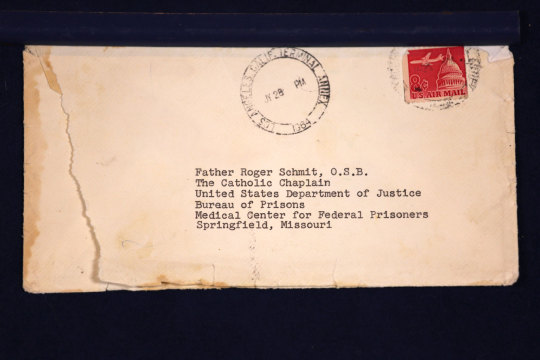
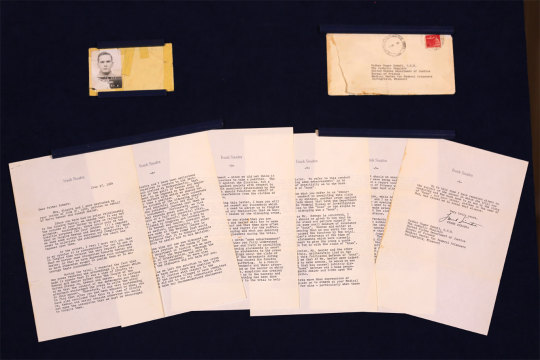
Frank Sinatra was deeply affected by Frank Jr.’s Dec. 1963 kidnapping. Sr. habitually carried 10 dimes in his pocket thereafter, mindful he might need them for emergency payphone calls.
Below, a transcript of Sinatra’s response to a prison chaplain’s letter.
July 27, 1964
Dear Father Schmit:
Mrs. Sinatra and I were disturbed by your letter of June 27, 1964, written on behalf of Barry Keenan and Joseph Amsler.
Since you have had no prior relationship to the Sinatra family, we assume that it was not the purpose of your letter to give us religious guidance. Accordingly, there could only be two possible purposes for your letter: (1) a request that we forgive Keenan and Amsler, and/or (2) that we take some action to express our forgiveness in order to alleviate the punishment the court has imposed upon them.
At the outset, I feel I must tell you that in my opinion it is presumptuous for you to ask us to forgive them because the very request presumes that we harbor some antagonism towards Keenan and Amsler, or that we have expressed such antagonism, or have otherwise sought to punish them or to encourage their punishment.
During the trial, I resented the fact that the press reported the proceedings in a manner which made it appear that it was a case of Sinatra vs. Keenan and Amsler rather than The People of the United States vs. Keenan and Amsler. It is obvious to me that the conduct of the defendants and their attorneys encouraged the press to write the story in this manner. Therefore, it was very distressing to find that after you had been exposed to them, you have also concluded that this is a case of Sinatra vs. Keenan and Amsler because otherwise you would not make the assumption that we must be encouraged to forgive them.
Mrs. Sinatra and I have been meticulous in conducting ourselves to conform to the decision that we each arrived at independently, that the determination of the guilt of Keenan and Amsler and the punishment to be imposed in the event of their guilt were matters with which we should not be concerned or take a position. We were concerned that the persons accused of the kidnaping should receive a fair and impartial trial and that if found guilty, the punishment imposed upon them be an intelligent punishment. Fortunately, we live in a country that expends great sums of money to assure defendants of a fair and impartial trial. After the trial, we were thankful that a procedure had been established by Congress and invoked by Judge East as to Keenan and Amsler, pursuant to which extensive medical, psychological, and other evaluations were made at the Medical Center in Springfield, Missouri, so that Judge East would have all the guidance that it is humanly possible to make available to assist him in his decision.
From the time our son was kidnaped, we placed the entire problem in the hands of the United States Department of Justice and we were indeed thankful that the Department, through the Federal Bureau of Investigation, was able to return our son to us unharmed. We were also thankful that the kidnapers did not harm our son.
Just as we left the solution to the crime to the FBI, we have never taken any position with the Department of Justice with respect to the prosecution of the persons alleged to have committed the crime and did not in any way communicate with Judge East to make any recommendations whatsoever about the punishment – since we did not think it was within our province to take a position. The crime is not just against the Sinatras, but a crime committed against society with respect to which the excellent machinery established by the Federal Government should function on behalf of society without interference from the victims of the crime or others.
After reading this letter, I hope you will understand why I must resent any statements which imply that there is a need to advise us to forgive Keenan and Amsler and any implication that we harbor any animosity by reason of the kidnaping crime.
In your letter you state that you are convinced that Keenan and Amsler will try to make amends for their conduct and that they have often expressed their sorrow and regret for the suffering caused by the kidnaping and what you describe as “perhaps some embarrassment during the trial.”
Your use of the words “some embarrassment” caused me to wonder whether you fully understand that the defendants Amsler and Irwin by permitting their counsel to make opening statements in court about a “hoax” and to make statements to the press outside the court proceedings about the claim of “hoax,” and the conduct of the defendants during the trial and afterwards has caused the Sinatra family great anguish and suffering. As a result of the conduct of said defendants and their attorneys and the effect this had on the manner in which the press reported the case, suspicion was created in the minds of many people as to the honesty and truthfulness of our son. Nothing has been done by the defendants subsequent to the trial to help remove that suspicion. To refer to this conduct as “perhaps causing some embarrassment” is to indicate a lack of sensitivity as to the harm done by the claim of “hoax.”
Aside from what you refer to as “embarrassment,” their conduct in permitting this claim of “hoax” was, in my opinion, another crime against society. This claim meant that both the Department of Justice and the Federal Bureau of Investigation were either parties to the “hoax” or too stupid to realize that the kidnaping was a “hoax.”
In my opinion, Mr. Amsler and the other defendant, Mr. Irwin, deliberately lied on the stand concerning this fabricated defense of “hoax.“ It would seem to me that if Mr. Amsler were indeed sorry and wanted to make amends, he would be man enough to insist that his counsel publicly disclose that the “hoax” defense was a hoax perpetuated by defendants Amsler and Irwin upon the court and the public.
It requires more than expressions of regret to a Chaplain or to others at your Medical Center to atone for sins – particularly when those expressions of regret should be examined in light of the fact that they were being made to persons who are going to write a report upon which the Director of the Bureau of Prisons would prepare a recommendation to Judge East with respect to the sentencing.
As to Mr. Keenan, while he did not testify as to a “hoax,” it would seem to me that he should also be man enough to make extensive efforts to publicize the fact that the claim of “hoax” was completely without substance.
Perhaps the defendants in this case will be able to convince the authorities that must now sit in judgment as to the length of their sentence that they want to make amends to the victims of the crime, but it is my hope that the persons upon whom the duty of making that judgment now rests will impose a stricter test. They have an opportunity to make amends by taking direct and vigorous action to dispel any suspicion that the kidnaping was a “hoax” and that my son participated in the arrangement of his own kidnaping for the purpose of gaining publicity. In my opinion, my son has either gotten over the effects of being kidnaped or will easily get over any adverse effects of the kidnaping since I think he is a strong person; however, unless something affirmative is done by the defendants, the cloud of suspicion which hangs over his head will continue to affect adversely his life and his career.
Up to this time I have remained silent on the subject of the manner in which the trial was conducted and the harm done to my son by the claim of “hoax”, but your letter, written in the name of God, has caused me to break that silence.
Very truly yours,
FRANK SINATRA
Father Roger Schmit, O.S.B.
The Catholic Chaplain
United States Department of Justice
Bureau of Prisons
Medical Center for Federal Prisoners
Springfield, Missouri
11 notes
·
View notes
Note
5, 6 (i already know this is some insane amount), 9, 10, 16, 23, 26 (house)
BAAABE :*
5. What is the perfect environment for you to write in?
my office cubicle apparently kdsjfnksd
no but genuinely anywhere i can zone out. i make faces & mutter to myself when i write tho so, anywhere where that wouldn’t draw weird glances lmfao
6. If you’re really concentrating, how many words can you write in a day?
bahahaha i think Farmer’s Almanac holds the record rn—10k, give or take.
9. Do you prefer to write AUs, canon divergence, or canon-compliant fic?
#selfintrospection, my pattern per fandom seems to be starting with canon divergence! I’m a side characters ho, y’all know this, so I always like to recenter the narrative & get a surer foothold in my own interpretations of character first. but after that.... no preference! I love (and have written) all three to great enjoyment heheheh just depends on where i wanna see ‘em fuck
10. Do you enjoy writing dialogue, exposition, or plot the most?
NFJDNFJDNFJD HOW CAN I CHOOSE
Exposition is sexy, and i get to be the most experimental & excessive & self-indulgent here w/ style choices.
Dialogue is sexy, ‘cause voices and humor and dirty talk and heartbreak and communication!!! I’m a movie ho so i’m all about that plot-driving script game ;;;;
Plot is sexy ‘cause that’s where you get to fuck around with all the canon themes, subvert & avert & redistribute them!!!!!!!! I’m a slut for that!!!!!!!!!
can’t choose won’t choose :’D
16. What is your most underrated fic?
LMFAO you know i’m gonna say Sword of the Yi Maiden ;) she’s basically like, our child ;;
23. If you had to remix one of your own fics, which would it be and how would you remix it?
well once i sort out the single dad!Song Lan universe, i’d loooooove to switch gears & swerve into single dad!Xiao Xingchen B) just for kicks. But where Song Lan is like, a high school lit teacher and A-Qing is our favorite local delinquent child. XXC gets called in for a parent-teacher conference, and he’s actually kind of dreading it at first because AQ honestly never had too many complaints about the English teacher, so if this Song Laoshi was suddenly going to betray his daughter’s trust and tattle on her XXC would def take AQ’s side.
But! Turns out SL’s calling him in to be like “hey, AQ never does homework but is fine with participating in class if i kind of trick her into arguing about it, so i figured she just really doesn’t like being told what to do. That’s fine! But that also means I don’t think she’ll respond well to me sitting her down to talk about her higher education options, so I figured I’d run it past the parent first to see if you have any thoughts about how we’re going to proceed.”
it’d be SO fucking funny... AQ stops skipping class or stops zoning out the moment she catches onto her dad’s little ~thing for Song Laoshi. She starts challenging him in class instead on every little thing (”yeah but don’t you think it’s inherently racist to require us to read conrad at all, if there are so many books out there written by actual African postcolonial authors”) but he’s just happy she’s engaging so they bond
they’re both super proud and near tears at graduation, and AQ is too but to hide her own embarrassingly feelings she’s like “don’t pretend y’all aren’t just crying ‘cause you can finally date each other now that it won’t be fucking WEIRD for me”
26. Which part of House was the hardest to write?
hmmmmm I think I had the most number of false starts w ch. 3!! i never save shit rip but at one point i straight up had like.... 13 pages all blacked out? Oh i remember, the scene where AQ first tests SL. I had that set in like, the breakfast stall, in a busy street, a quiet street, etc. etc. I was putting each of their conversations in different contexts too, just seeing how they would play out based on the surroundings??? i even thought about dropping AQ’s POV completely at one point but I’m very glad i didn’t. The current version is actually the very first opening for the chapter i ever wrote so, el oh el, i try not to think all that effort went to waste. It’s more like, I had some ideas, but i had to prove none of them would work before i could proceed with this one, y’know?
BUT TELL YOU WHAT I DID SAVE THO. The first draft of the Ch. 2 opening? After I wrote this i was like “yikes this is way too conventional a set-up for a flashback let’s just do it,” and wrote the current version on ao3 lmao. I kept the chapped knuckles thing~
Under the Cut:
((Behind the Scenes of Fic Writing Asks!))
Song Lan stood at the entrance of his room in the inn, fist clenched hard around Fuxue’s hilt as the rain came in. Night had been the herald, and now, the lantern at the top of the stairs to Song Lan’s left was flickering wildly, buffeted about by the stormy wind.
The inn’s owner, an older woman in her 50s, spoke a string of worried utterances as she hurried up the stairs to close the window. As her hands approached the latch though, Song Lan sensed bloodthirst. Fuxue went flying.
The woman screamed, but the harm was over; a mutated critter of a hungry ghost slumped against the window frame, pinned there by Fuxue’s cool blade. Instead of closing the window for her, Song Lan pressed two paper talismans on either side. He pulled out Fuxue and watched the hungry ghost dissipate.
“Daozhang, daozhang, gratitude,” the woman wept. “A few here and there is nothing, you know? But once they begin to stay, and bigger things start to come, and we have young ones in the house, oh, it terrifies me, what state this city has been falling into…”
Fuxue returned to its sheathe, and Song Lan still had his fly-whisk tucked in his arm. He gave the inn owner a polite bow.
“I will attempt an extermination tonight.”
“Daozhang is so reliable,” the woman said, tears instantly transforming into simpering gratitude. Her distress had been in part a show, meant to move Song Lan into action. Song Lan did not mind; this was his third night at the inn, after all, and the second time the inn owner’s requested a favor from him. It stood to reason that she would think he needs more affective convincing, even if she’s wrong.
“I may trouble you for tea upon my return,” he murmured. When the woman reached out to pat his elbow in a matronly gesture, Song Lan stepped back, disguising the gesture as a readjustment of his robes as he replaced the stack of talismans back in his sleeve.
“Of course,” she replied, hand waving in the air before lowering back down to her side. A spot of tension eased at the base of Song Lan’s neck. “The stove never stops burning in our kitchen, particularly when we have guests. Just give our door a knock if the evening chef isn’t around. We’ll take care of you.”
Song Lan was grateful. He’d need the hot drink when he returned from the rain—soaking in the deluge always left his skin feeling beaten and bloated. And the sensation, if untreated, never failed to transform itself into two long iron nails hammered deep into his skull and brain. The pain was best avoided if at all possible.
(Xiao XingChen knew this about him. Nothing’s ever eased the migraines faster than XingChen’s smile as he wordlessly pushed a cup of hot water or tea across the table. Nothing’s ever distracted Song Lan from the pain more effectively than wondering exactly what would happen, if XingChen’s fingers lingered and his own could touch, just lightly, those perpetually chapped knuckles.)
(Take better care of yourself, Song Lan had once chastised when blood came seeping up between cracked skin.
I forget to, XingChen had confessed, sheepish lines crinkling around his eyes.
Had Song Lan been anybody else, he would’ve said out loud what he wished he could’ve said out loud: I’ll do it then.
Had Song Lan been anybody else, he would’ve thumbed a layer of protective grease over Xiao XingChen’s dry hands himself, save them both the need for cheesy lines and impotent promises. Words often got him into trouble, he knew this; he much preferred the vows made in every shared action that was mutually fostered into consistency. But what did it say about him, that his hands flinched from touch and Xiao XingChen walked at a careful radius around him, that he couldn’t make a vow on any level that counted?)
The extermination was no reprieve from the discomfort, the dissatisfaction, the disassembly of it all. The sky was falling apart and so was his skin. Moderation was less a stranger to Song Lan than longing, but tonight, the berating of his body was not moderated at all.
A year of searching, over, just like that.
An opportunity to apologize, gone, just like that.
A promise.
A dream.
So do you like him then? You want to really build a family with him?
Gone. Just like that.
5 notes
·
View notes
Text
SEXUALITY. AND OTHER STUFF.
I KNOW THAT RIGHT NOW, EVERYONE SEEMS TO BE FIGHTING TO BE RECOGNISED, AND VALIDATED WHEN IT COMES TO THEIR SEXUALITY AND GENDER.
I’VE A TRANSGENDER LESBIAN DAUGHTER AND SHE TRIES HARD TO EXPLAIN THE MULTITUDE OF WAYS PEOPLE EXPLAIN WHO OR WHAT THEY ARE IN THAT.
AND I PROBABLY WILL NEVER UNDERSTAND IT ALL. CUT ME SOME SLACK THOUGH. I WAS RAISED IN A TIME WHEN YOU HAD STRAIGHT OR GAY AND THAT WAS IT. I’M TRYING TO. BUT I’M THAT “BORING” THING, AN OLD STRAIGHT WOMAN, NOT UP TO DATE WITH MODERN TERMS, LABELS (WHY DO FOLKS NEED THOSE BTW?)
AND HERE’S THE THING THAT PUZZLES ME MOST OF ALL...WHILST I RECOGNISE THE ABSOLUTE RIGHT OF FOLKS TO LIVE WHICHEVER WAY THEY CHOOSE SO LONG AS THEY’RE NOT HARMING OTHERS (POLITICIANS, TAKE FUCKING NOTE YOU BASTARDS!) I JUST DON’T UNDERSTAND WHY ANYONE’S SEXUALITY OR GENDER IS ANYONE ELSE’S BUSINESS.
LIVE AND LET LIVE. I’M PROBABLY GONNA COME ACROSS AS JUST AN OLD PRUDE NOW (ANYONE WHO KNOWS ME WILL TELL YOU I’M FAR FROM IT) BUT TBH, SHOULDN’T INTIMACY AND SEX BE PRIVATE? UNLESS YOU’RE INTO PUBLIC ORGIES OR SUCHLIKE...THEN I GUESS PRIVACY ISN’T YOUR THING REALLY.
BUT FOR THE MAJORITY OF US, WHY THE NEED TO JUSTIFY OFFERING YOUR NAME THEN FOLLOWING UP WITH “GAY” “BI” “PANSEXUAL” OR WHATEVER?
DOESN’T THAT ONLY MATTER IF SOMEONE ACTUALLY *ASKS* YOU ABOUT IT? AND IF THEY ARE, WHY AREN’T YOU TELLING THEM TO MIND THEIR OWN FUCKING BUSINESS?
I *KNOW* I’M OLD FASHIONED, BUT HONESTLY, I DON’T MEET PEOPLE, SAY HIYA TO THEM THEN THE FIRST THING I ASK IS “BTW, WHAT’S YOUR SEXUAL PREFERENCE?”
WHEN I MEET GAY LOVERS I DON’T NEED TO ASK THEM. IT’S OBVIOUS. DOESN’T TROUBLE ME IN THE LEAST AND I’M NOT INTERESTED BECAUSE, PEOPLE’S INTIMATE LIVES SHOULD BE JUST THAT...INTIMATE. PRIVATE.
I “GET” THAT MANY FEEL THEY HAVE TO FIGHT FOR THE RIGHT TO *BE* WHAT THEY ARE. AND NO, IT ISN’T A MATTER OF KEEPING YOUR SEXUALITY HIDDEN.
IT’S JUST, YOU’RE SO MUCH MORE AS A PERSON THAN WHO OR HOW YOU MAKE LOVE TO. JUST SAYING. YOU’VE MORE FACETS TO YOU THAN SEXUALITY.
USED TO BE, SOME WOULD INTRODUCE THEMSELVES THEN FOLLOW IT UP WITH “I’M A MUSICIAN/ARTIST/DANCER” WHATEVER, AND YOU COULD GET A DIALOGUE GOING WITH THAT.
BUT TO MEET SOMEONE WHO GREETS YOU WITH “HELLO, I’M ANNA AND I’M ASEXUAL” IS JUST...WELL, WHAT DO I SAY TO THAT? I WASN’T EVEN WONDERING ABOUT WHAT YOUR SEX LIFE WAS LIKE. OR NOT. IT ISN’T SOMETHING I THINK ABOUT. WHEN I MEET NEW FOLKS (ADMITTEDLY, POST LOCKDOWN, THAT’S NOT OFTEN NOW) I’M INTERESTED IN WHO THEY ARE, WHAT THEY LIKE TO DO (SEX ASIDE) AND WHERE THEY’RE FROM, ETC, THAT KINDA THING.
WE’VE COME SO FAR FROM THE DAYS WHEN YOU COULDN’T EVEN MENTION SEX AT ALL EXCEPT IN METAPHORICAL PROSE OR SUCHLIKE.
NOW IT SEEMS IT’S ALL (SORRY FOR THIS...) THRUST IN OUR FACES, ON SHOWS AND SERIES (COUNT THE MINUTES TIL THE FIRST COUPLE FUCKING, REALLY..EVEN IF THE PLOT DOESN’T CALL FOR IT) TO FOLKS INTRODUCING THEMSELVES BY STATING WHAT THEY ARE.
BELIEVE IT OR NOT, LOTS OF US, AYE, EVEN US OLD FARTS, DON’T MIND WHAT YOU ARE AND NEVER GIVE IT A THOUGHT.
AND NO, IT’S NOT BECAUSE WE’RE DEAD FROM THE NECK DOWN.....
IT’S JUST, WHAT HAPPENED TO PRIVACY? MYSTERY? FOLKS MINDING THEIR OWN BUSINESS? WHY DOES THE WHOLE WORLD HAVE TO KNOW?
OK, THAT’S MY SOAPBOX RE SEXUALITY.
THE “OTHER STUFF”?
THE BLACK VS WHITE THING IS GETTING OUT OF HAND.
THE OTHER DAY SOMEONE HAD A GO AT ME BECAUSE I’M WHITE. BECAUSE I’M WHITE, I’M EXPECTED TO SOMEHOW ATONE FOR THE ACTIONS OF WHITE PEOPLE IN THE PAST WHO PARTICIPATED IN THE SLAVE TRADE.
I CAN’T. AND I WOULDN’T. BECAUSE I WOULDN’T PARTICIPATE IN ANY SLAVE TRADE AND I AM NOT GOING TO BE HELD RESPONSIBLE FOR THE ACTIONS OF PEOPLE NO LONGER ALIVE.
I ALSO GOT THE NOW OLD “WHITE PRIVILEGE” SHIT. WELL, I’VE ALREADY BLOGGED ABOUT THAT. I’M WHITE BUT MY LIFE HAS BEEN FAR FROM PRIVILEGED. SO IF I’M GOING TO BE ACCUSED OF IT, PLEASE CAN I HAVE SOME FIRST SO I CAN TRY IT OUT, AT LEAST? BECAUSE I HAVE NO IDEA WHAT IT FEELS LIKE.
AND AS FOR SLAVERY, THE FOLLOWING LINK IS BUT THE TIP OF AN ICEBERG...https://www.electricscotland.com/history/other/white_slavery.htm
WE ARE ALL A HUMAN SPECIES MADE UP OF RACIAL GROUPS WHO HAVE ALL, AT SOME POINT IN HISTORY, MADE WAR, CONDUCTED SLAVE TRADING AND CONQUERED WEAKER PEOPLES. THAT’S HUMAN NATURE AND FRANKLY, FUCK ALL TO DO WITH RACE.
SO, I MIGHT BE AN AGEING OLD WHITE WOMAN, BUT I’M STILL VOLATILE ENOUGH TO GET RILED UP WHEN I GET ACCUSED OF BEING PART AND PARCEL OF SOMEONE ELSE’S RACIAL AGENDA. BECAUSE TO TELL SOMEONE THEY SHOULD BE ASHAMED OF THEIR CULTURE, HERITAGE AND SKIN COLOUR *IS* RACIST. AND NO, NOT ALL WHITE CULTURE AND HERITAGE HAS BEEN AGAINST OTHER RACES. STATE THAT AND YOU IGNORE CONTRIBUTIONS TO SCIENCE, TECHNOLOGY, ART, MUSIC AND MEDICINE ETC THAT BENEFITS EVERYONE.
IF YOU HAVE A GENUINE GRIEVANCE AGAINST A GROUP OR RACE OF PEOPLE, AIM AT THE CORRECT TARGETS..EITHER RAGE AT THOSE OF THE PAST, LONG DEAD, WHICH IS FUTILE, OR AIM AT THE PEOPLE WHO PERPETUATE THE REASON FOR YOUR GRIEVANCE, WHO TODAY ARE LIKELY TO BE POLITICIANS.
BUT THE BULK OF ORDINARY FOLKS SIMPLY TRYING TO LIVE AND LET LIVE? LAY OFF. JUST AS A PERSON OF COLOUR IS A PRODUCT OF THEIR BIRTH, SO IS A WHITE PERSON.
AND IN THE END, WE’RE ALL JUST PEOPLE. MAYBE WE SHOULD REMEMBER THAT.
RANT OVER. I’M NOT A “RACIST” FOR BEING WHITE. AND BECAUSE I TALK ABOUT MY ANCESTORS AND THEIR CULTURES DOESN’T MAKE ME “RACIST”. END OF.
1 note
·
View note
Text
Post 1 - Multicultural America
1.What is the subject of your film, program, or internet/social media selection? Provide a brief summary, describing your selection and how it relates to our course topics, readings, and screenings.
For the first post, I picked the movie District 9. District 9 is 2009 Sci-Fic action movie that is set in South Africa. The story starts off with a UFO, filled with aliens inside, touching base in a major city in South Africa.
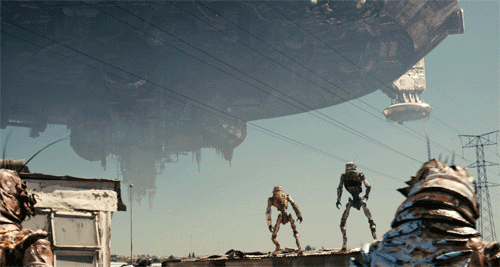
Naturally, the entire world does not react well to the new arrivals. However, as the movie progresses, it becomes obvious that the aliens are a metaphor for a marginalized race. The location for the film couldn’t have been perfect enough, given the history of South Africa. Apartheid ended in 1994, a mere fifteen years before the start of this movie. It was not that long ago where segregation was a reality for South Africans.
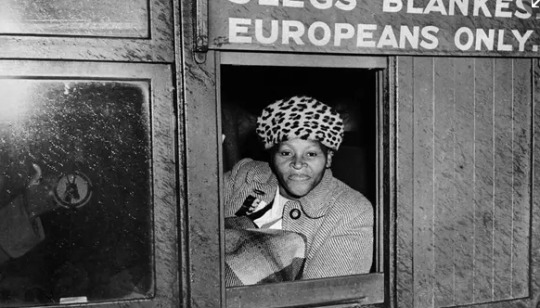
The reality for the aliens in the movie is not a far cry from the discrimination the South African government expelled on to their own citizens. Aliens aren’t allowed to enter certain areas, aren’t allowed to have intercourse with humans, aren’t allowed to eat in the same locations, and many other inhuman restrictions as well.
The movie tries to end on a positive note, showing us there is a way for oppressors to understand the oppressed. Unfortunately, it was only because a human was mutating into an alien and subjected to the same discrimination.
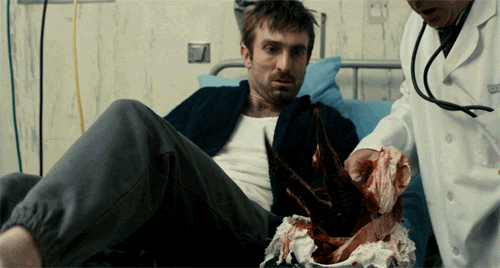
In a dark, pessimistic way, it is saying that perhaps we cannot see the true harm in the unfair power dynamic unless we’re no longer benefiting from it. It shows how things won’t change until those with the privilege step up and decide to dismantle the system they gain from.
Comparing this movie to something from my reading, I would have to connect it to the Jim Crow laws in the United States. African Americans were faced with harsh treatment at every front. Obtaining a job was difficult, dating a white person could lead to being lynched and legal troubles, and the creation of a mixed-race child was a crime.
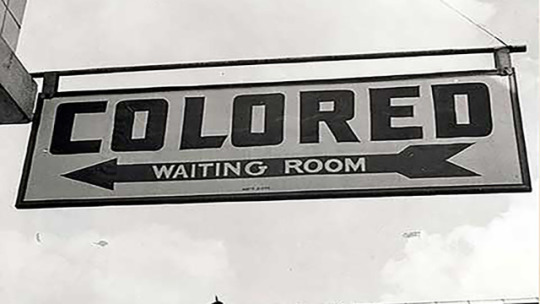
Both the movie and the harsh factors of segregation show that the reason for their hatred, for their inhuman actions, and unjustifiable behavior came from ignorance. False narratives and stereotypes were used to justify the nature of the oppressive system they created, thinking that would bring order in their world. In the end, it only caused disorder until justice was served.
2. Referring to related and appropriate readings and screenings from the course, describe how your selection represents racial and ethnic identities (and if applicable, intersectionality). In what ways does your selection for each of the journal entries generate a conversation regarding race, ethnicity, and cultural diversity?
For the movie I picked, you can see how it relates to racial and ethnic identities through the science fiction element of aliens. In their world, the grievances usually associated to immigrants and minorities is pigeonholed into one singular group: the new extraterrestrial life form. They are written off as violent, lazy, rampant in childbirth, and destructive in nature. The humans question their intelligence often, though ironically want the high-tech guns the aliens have brought along with them.

The way newcomers, arriving to the United States, have been treated throughout history has shown that it isn’t always pleasant. For Chinese immigrants, many faced push backs from gold miners, essentially forcing them into the laundry market because of the over taxation placed on the mines. A more comparable experience would be with indigenous people consider, for most of the plot of the movie, the South African government is trying to relocate the aliens to a new reservation. Similar to that outcome, Native Americans were also uprooted from their land and told to move to another plot of land. In the movie, the South Africans do not believe they can live in the same area as the aliens. And for President Andrew Jackson, he felt the exact same way about Native Americans.
“In Jackson’s view, Indians could not survive living within white society […] Drive by ‘feeling of justice,’ Jackson declared that he wanted ‘to preserve this much-injured race.’ He proposed a solution—the setting aside of a strict west of the Mississippi ‘to be guaranteed to the Indian tribes as long as they shall occupy it.” (Pg 81, Takaki)

Andrew Jackson saw the relocation as essential for Native Americans for them to intergrade into American culture. He offered land for the Natives to farm on, believing that somehow that would encourage them to opt to a farming lifestyle like white settlers. What Andrew Jackson and the South Africans in this movie both struggle to grasp is this: consent.
No one asked Native Americans if they wanted to be uprooted from their homes and forced on to reservations. And same for those aliens, they were not given any say on their relocation. When it comes to the opinions of minorities and other marginalized groups, it’s common to see the trend of dehumanization and removing the ability of choice.
When you strip a human from the ability to make choices on their own and use their voice, then do you even see them as an equal at all? No, of course not. People you make choices for are children, meaning that was what they saw in these individuals. They saw them as incapable, but not because they actually were, but because of ignorance and racism. For the movie, specism.
3.How does your selection relate to the course readings, screenings and discussions? Reflect upon the representation and circulation of racial and ethnic identities in popular visual culture. Your reflections should be attentive to the intersectionalities of race, ethnicity, sexuality, religion, socioeconomic class and gender.
As I have stated above, the movie District 9 connects to Jim Crow laws, segregation, and Native American removal. Aliens were limited from participating in activities humans were allowed to and prevented from prospering. They were negatively depicted in the media and rarely shown in a positive light. Media, as history has shown us, plays a vital role in perception.
In the earlier stages of Hollywood, the depiction of minorities was played by white actors, making a mockery of the ethnic group they were portraying. Due to years of boxing people of color into outrageous caricatures, it has left a lasting impression in media—even to this day. Some may brush off media as a fleeting set of pictures, unable to capture and captivate our lives, but one should not be so dismissive of the images that come their way.
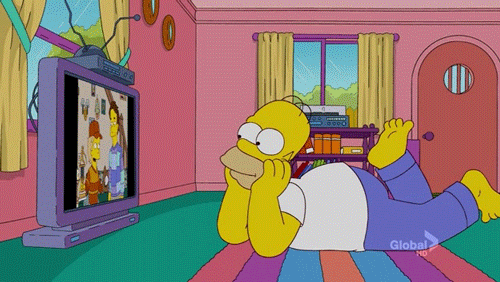
“People who have never interacted with a black family in their communities more easily embrace what the media tells them. […] In worst case scenarios, black boys and men actually internalize biases and stereotypes and, through their behavior, reinforce and even perpetuate the misrepresentations. They become victims of perception.” (Donaldson, The Guardian)
Naturally, since we were children, we internalize the images we see. There’s a great deal of impact on the content we consume. Because of redlining, it has made communities just as closed off to diversity as they were before. To this day, someone could live their life not truly being friends with someone from a particular ethnic or racial background. What exactly will that person think of said individual if all they have to learn about them are bad depictions from movies? The result is detrimental. That is why representation of all groups, races, religions should be embraced. When you show a narrow view on something, you are only hurting the viewers in the long run.
For me, speaking as a Muslim, it’s surprises me how often people misrepresent my faith. It’s even more upsetting at how closely connected my own religion is to those who try to dismantle its existence. I have lost count of the amount of times I’ve heard my friends get shocked that I believe in Jesus, Abraham, and the same biblical stories they heard of growing up. The thing is, if they would only open their eyes and not accept the first negative thing they heard about us, then maybe they could see more similarities than differences. In the end, that is what everyone in a marginalized group hope for—acceptance and inclusion.
Sources:
Page 81, Takaki
A Different Mirror: A History of Multicultural America
Takaki, Ronald
The Guardian
Donaldson, Leigh
Title: When the media misrepresents black men, the effects are felt in the real world (https://www.theguardian.com/commentisfree/2015/aug/12/media-misrepresents-black-men-effects-felt-real-world)
2 notes
·
View notes